How to Write a Commemorative Speech to Make an Impact

Whether it’s about honoring someone’s performance or celebrating the colorful events, recalling the personal stories, or paying tribute to the legacy left by an individual, commemorative speaking is always in trend.
It can be a memorable event of your life and an opportunity to leave an impact on the audience.
A survey has shown that 64% of people feel pressure to perform and speak to an audience. The pressure may come from not knowing the basics or what topics to share. That’s why it’s important to learn how to write a commemorative speech.
Table of Contents

For Whom Commemorative Speech Is For?
- Students graduating from their academic institutions.
- Teachers addressing the class or any attendance regarding some memorable event.
- People who speak at their friends’ or relatives’ weddings.
- Anyone who wants to speak at someone’s funeral.
- Celebrities when winning an award or called for a lecture.
- Anyone who wants to speak and present their ideas, emotions, and feelings regarding an event, festival, or general experience.
Resources That Can Help You Write an Impressive Commemorative Speech
There are several factors that can help you prepare for a memorable speech with complete accuracy and authenticity.
Factors Affecting Students’ Speech Performance
Let’s take a look at these statistics. A study was conducted in Vietnam High School in order to investigate the factors affecting students’ speaking performance. researchers have found some of the major factors that make or break a speech.
Let’s take a look at those factors to learn what is most important while preparing for a commemorative speech.
Source: Asian Journal of Educational Research
What is a Commemorative Speech ?
A commemorative speech serves as a tribute, an eloquent homage, or a celebration of a person, an event, or an achievement. It serves to honor the essence, significance, and impact of the subject being commemorated.
Furthermore, it uses different types of tones in writing and stands as a vessel that transports the audience through cherished memories, remarkable achievements, or profound influences.
It encapsulates the essence of the individual or event being celebrated, imprinting a lasting tribute within the hearts of the listeners.
Challenges for Students While Writing Speech of Commemoration
Emotional Depth
Expressing genuine emotions and capturing the essence of the subject while maintaining composure can be challenging.
Finding the Right Words
Struggling to find appropriate and impactful words to honor the significance of the individual or event being commemorated.
Structural Clarity
Establishing a clear structure for the speech, including the introduction, body, and conclusion, while maintaining a coherent flow of ideas.
Balancing Emotions and Facts
Ensuring a balance between emotional content and factual accuracy While Writing About Commemorative Speech Topics, especially when recounting historical events or achievements.
Addressing Audience Sensitivities
Navigating sensitive topics or delivering speeches to diverse audiences while considering varying perspectives and sensitivities.
Researching the Subject
Conducting thorough research to gather relevant and accurate information about the individual, event, or achievement being commemorated.
Time Constraints
Managing time effectively to both research comprehensively and craft a well-structured, impactful speech within a limited timeframe.
Overcoming Nervousness
Overcoming stage fright or nervousness when delivering the speech, especially when the subject holds personal significance.
Maintaining Honesty and Authenticity
Struggling to strike a balance between honoring the subject authentically and avoiding exaggeration or misrepresentation.
Capturing Audience Attention
Ensuring the speech captivates and engages the audience throughout its duration, leaving a lasting impression.
How to Write a Commemorative Speech? 10 Steps
Here’s a step-by-step guide for you to learn how to write a speech to commemorate that also includes some excellent commemorative speech examples to improve your understanding.
Plus you will also get an idea of what to pick from different speech topics as the examples below are on different subjects. So Let’s s begin:
Step 1: Pick a Subject
The first step is to choose a topic and determine what is commemorative speech about. You can pay tribute to someone’s legacy, acknowledge contributions, or salute to the welfare cause of any personality. Go through some interesting informative speech topics to have an idea about your speech.
Suppose that you are going to make a speech of commemoration to honor the 30 years of teaching services of Mrs. Thompson.
Impact and Legacy
The positive impacts of Mrs. Thompson are not only limited to her academic successes. Rather her commitment and compassion toward teaching have enabled many students to realize their dreams.
Significance for This Commemorative Speech
Keeping in view the 30 years of teaching services in shaping students’ futures, the retirement of Mrs. Thompson brings the end of the fruitful career that deserves to be honored and celebrated.
Example Speech Point
Today, as we are here to recognize the extraordinary career of Mrs. Thompson, we not only pay tribute to the end of an era but also honor the long-term effects of an exceptional educator.
The great legacy she left goes beyond just the culmination of the 30 years spent in the classroom; it incorporates the countless stories of individuals whose lives were ignited by her inspiration and mentorship.
Like the example, make sure to use the appropriate type of text structure that conveys the right sense and meaning as per the context. make sure to use the right type of text structure that conveys the proper sense and meaning in a specific context.
Step 2: Research Thoroughly
The best way to comprehend what is commemorative speech is collecting the data and information about the particular topic. It is an important step in learning how to write a commemorative speech. You can go for the personal anecdote or visualize the historical context to set the well-rounded stage.
Visit the different online resources to gather the relevant information for instance, if you are going to make a speech about Rosa Parks.
Biographical Details
Provide the basic information such as date of birth, early education, family background, etc. Check out some persuasive speech topics about family of that subject to get a clear idea.
Significant Achievements
Shed light on her important life achievements such as how she played an active role in the Civil Rights Movement and the Montgomery Bus Boycott.
Personal Anecdotes
Explore data about her personal stories, such as you can highlight her commitment, determination, and resilience she showed during the movements.
Historical Context in Commemorative Speech
Discuss her practical role within the broader spectrum of the movements. Contextualize the results of her actions on the society as a whole.
Example Research Findings
Rosa Parks was born on February 4, 1913, in the city of Tuskegee, Alabama. She became popular due to her active role in the Montgomery bus Boycott. One of the most pivotal moments of her life was her refusal to give up her seat to the white passenger, which infused the motivations in the Civil Rights Movement.
In the given example, the research involves collecting the relevant data about Rosa Parks. which includes gathering her biographical data and highlighting her key achievements during the Civil Rights Movement.
Step 3: Define the Purpose for Commemoration Speech
Identify and decide the tone and style of your speech that aligns with the speech objective and the audience’s interest. For instance, the tone can be celebratory, reflective, or a combination of both.
Now, let’s take an example to decide upon the tone of a commemorative speech by using the example of the community leader, Sarah Johnson.
Determining Purpose and Tone
Purpose: This research aims to acknowledge the decades-long services of Sarah Johnson for the community.
Tone: Here, we can adapt the celebratory or reflective tone while celebrating Sarah’s achievements and reflecting upon her emotions as well as the lasting impacts of her departure.
Example Speech Tone
Today we are here to celebrate and pay tribute to the esteemed services rendered by the great community leader, Sarah Johnson. Let’s honor her tireless commitment and dedication she devoted to improving all of our lives.
This example recognizes Sarah’s contributions and achievements toward humanity while allowing the audience to reflect upon the influence she had on society as a whole. Moreover, adopting this approach makes sure how to start a speech that acknowledges the legacy of Sarah Johnson in a suitable manner.
Step 4: Structure
Begin with some thought-provoking question that captures the audience’s attention as given in the below commemorative speech examples.
Divide the body section into logical sections and subsections. It can include personal anecdotes, achievements, or personality traits.
Conclusion
Close the speech by restating the key points and powerful words that leave the readers with lasting impressions.
Step 5: Craft a Compelling Narrative
Brainstorm the ideas and some storyline that logically establishes the relationship between different life aspects of the subject such as achievements that make the speech quite interesting.
Coming up with an engaging narrative can include combining the different aspects of the subject’s life into a smooth flow and structured story. Don’t understand? Ok, let’s understand this with an example that focuses on basically what is a commemorative speech by discussing a famous artist, Emily Harris.
Factors To Consider Before Crafting a Compelling Narrative
- Subject Overview
- Introduction
- Artistic Evolution
- Influence and Impact
- Personal Insights
- Legacy and Enduring Influence
Emily Harris, with her bold strokes and visionary concepts, revolutionized the art world. Her journey began with humble beginnings, experimenting with various mediums in a tiny studio. As she honed her craft, her breakthrough masterpiece, ‘Ethereal Fusion,’ captivated audiences, showcasing her mastery of color and form.
Step 6: Use Emotive Language
Employ vivid descriptions, anecdotes, and emotionally resonant language to captivate the audience and convey the essence of the subject.
Employing vivid descriptions, anecdotes, and emotionally resonant language is crucial to engaging the audience and conveying the essence of the subject in a commemorative speech. Let’s explore this through an example focused on honoring a philanthropic figure, James Thompson:
Using Emotionally Resonant Language
- Vivid Descriptions
Use evocative language to describe James’s passion for aiding others. “James Thompson, a beacon of hope in the community, possessed an unwavering commitment to alleviating suffering and fostering positive change.”
Share compelling anecdotes that showcase James’s selflessness and impact. “I remember the day when James single-handedly organized a food drive that fed hundreds of families during a crisis, demonstrating his compassion and proactive spirit.”
- Emotional Resonance
Use emotionally resonant language to convey the depth of James’s contributions. “James’s empathy knew no bounds; his dedication to uplifting the underprivileged touched countless lives, leaving an indelible mark on the community’s collective heart.”
Commemoration Speech Examples
In a world often clouded by darkness, James Thompson emerged as a beacon of compassion and action. His unwavering dedication to humanitarian causes transformed countless lives, bringing light and hope to those in need.
Expanding on It
In one of these forms of creative writing , employing emotionally resonant language involves using descriptive phrases that evoke strong emotions and portray James Thompson’s altruism vividly.
Step 7: Balance Emotion and Information
Maintaining the balance between emotions as well as information includes combining factual information with storytelling regarding commemorative speech topics. To comprehend it more clearly, we are going to take the example of Dr. Maya, a well-known scientist.
Dr. Maya is a popular scientist who is known for his creative work in the field of environment.
- Emotional Storytelling
In order to highlight the Dr. Patel contribution for the environmental protection, you can go with some emotional storytelling techniques here. Dr.Patel was profoundly influenced by his childhood passion for the environment and nature. You can look into some narrative and demonstration speech ideas to get a clue of how storytelling can enhance speech impact.
- Factual Information
Make use of some facts and statistics about the contributions of Dr. Patel in protecting our land. For example, her creative solutions in sustainable energy resources helped her to earn immense applause from the community.
- Anecdotes and Emotions
You can use personal stories to mark Dr. Patel’s work in providing us the better environment to live in. Her written publications are evident of her work while throwing away the comfort.
Dr. Patel’s passion for conserving our environment stems from her love of nature. Her innovative work for the environment not only earned her global fame but also introduced academia with a pioneering work in renewable energy solutions.
Step 8: Consider Audience Sensitivities
Including audience sensitivities and emotions while writing the commemorative speech is important. Let’s take another example to honor the cultural icon, Maria Gonzales.
Being Mindful of Audience Sensitivities
It is crucial to acknowledge the varying opinions and beliefs within the audience. “Maria’s message of inclusivity goes beyond the limitations and touches the hearts of the people from diverse cultures and backgrounds.”
Consider the emotions that universally establish the relationship between people. “Her unfaltering commitment to unity triggers appreciation thereby surpassing the cultural divides.”
Be careful while delivering the commemorative speech on sensitive topics to make sure that it remains respectable and resonates amongst people from all walks of life.
Example Segment Considering Audience Sensitivities
Maria Gonzales’ work for unity is revered by everyone who promotes unity and inclusivity. Her work goes beyond the cultural and religious barriers that unite us in every shared aspect and bring harmony.
Step 9: Practice and Refine
As it is said practice makes a man perfect so, practice your speech to commemorate to ensure that it goes with the right pace, tone, and style. Let’s take an example of a community leader, John Smith.
Rehearsal Process
Practice Sessions: Repeat your speech at least three times by emphasizing its flow, pace, and emotions. Focus on how each section of the speech connects and makes transitions.
Tone and Emphasis: Exercise different tones and styles by repeating the important points. Make adjustments to your flow that bring an inspiring pause and moments of reflection.
Coherence and Impact: While exercising to learn what is a commemorative speech, analyze the speech’s logical flow to make sure that each section contributes to the overall message’s quality. Proofread and edit the speech to ensure that it makes a positive impact by following coherence. Although it’s quite challenging to practice, you can hire a creative writing helper , especially when you want to bring coherence to your speech.
Seek Feedback: Seeking feedback from your fellows and peers helps improve the areas where you require more work in your speech
Example Segment on Rehearsing the Speech
To acknowledge John Smith’s work, I have done a lot of practice on some commemorative speech topics and repeated the speech countless times. Each time I repeated the speech, it gave me a chance to come closer to perfection. Due to practice, I approached the right tone, style, and pacing in my speech to pay tribute to John Smith’s legacy.
Step 10: Deliver with Conviction
Be confident and speak loudly while you deliver the commemorative speech before the audience. Making eye contact with the audience will give you a chance to establish a connection and convey the emotions that you want to deliver through your speech.
Why is a Commemorative Speech significant?
Why is this speech important? Why should students learn speech to commemorate? These questions also came into the mind of this guide’s writer who shared, “I never understood the importance of commemorative speech until I did it and learnt how much it helped me grow as a person and sharpened my skills.”
Let’s discover how it helps students:
- In learning the art of honoring and celebrating important individuals, events, or achievements, fostering respect and appreciation.
- Fosters communication abilities, students encouragement to articulate thoughts, emotions, and stories effectively, and public speaking skills.
- Cultivates empathy and emotional intelligence by conveying the impact of the commemorated subject.
- Connect students with diverse audiences by conveying a compelling narrative, eliciting emotions, and leaving a lasting impact through words.
- Encourages reflective learning, prompting students to analyze and articulate the importance and impact of a person or event.
- Practicing research, organization, and critical thinking, fostering a deeper understanding of historical or personal significance.
- Allows students to appreciate and celebrate diversity by acknowledging and honoring various cultural, social, or historical contributions.
- Mastering the art of delivering a speech boosts confidence and self-assurance in public speaking and storytelling.
- Students acknowledge heritage, preserving stories and memories for future generations.
Final Thoughts
Delivering a powerful commemorative speech requires the art of capturing the essence of past moments in our lives. Every one of us has some colorful moments to celebrate and personalities to pay tribute etc. However, coming up with the right topic for speeches to commemorate is of much significance. Therefore, in this topic, we have covered the easy-to-follow solutions that make the entire process manageable.
Order Original Papers & Essays
Your First Custom Paper Sample is on Us!
Timely Deliveries
No Plagiarism & AI
100% Refund
Try Our Free Paper Writing Service
Related blogs.

Connections with Writers and support
Privacy and Confidentiality Guarantee
Average Quality Score
Speech Writing
Commemorative Speech
Commemorative Speech - Writing Guide, Outline & Examples
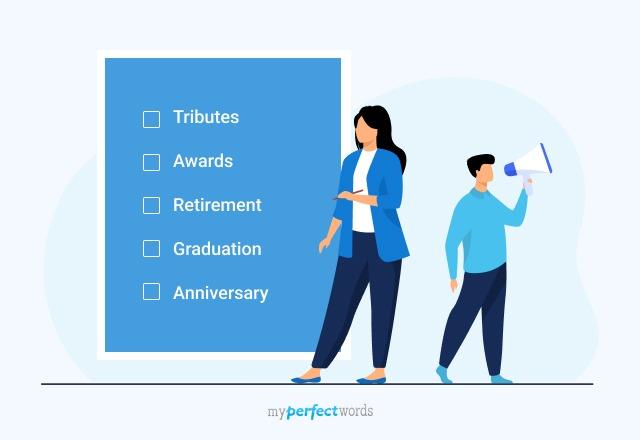
People also read
The 10 Key Steps for Perfect Speech Writing
Understanding Speech Format - Simple Steps for Outlining
How to Start A Speech - 13 Interesting Ideas & Examples
20+ Outstanding Speech Examples for Your Help
Common Types of Speeches that Every Speechwriter Should Know
Good Impromptu Speech Topics for Students
Entertaining Speech Topics for Your Next Debate
How to Write a Special Occasion Speech: Types, Tips, and Examples
Introduction Speech - A Step-by-Step Guide & Examples
How to Write the Best Acceptance Speech for Your Audience?
Presentation Speech - An Ultimate Writing Guide
Farewell Speech - Writing Tips & Examples
How to Write an Extemporaneous Speech? A Step-by-Step Guide
Crafting the Perfect Graduation Speech: A Guide with Examples
Ready to explore the world of commemorative speech writing? Don't worry, it's not as tricky as it sounds!
In this guide, we'll make it super easy for you. We've got all the tips and examples you need to create perfect commemorative speeches for any occasion. Whether it's for your school project, a graduation party, or a touching tribute to someone special, we've got your back.
Let's jump in and discover the secrets to crafting speeches that leave a lasting impression.
- 1. Commemorative Speech Definition
- 2. Commemorative Speech Outline
- 3. How to Write a Commemorative Speech
- 4. Types of Commemorative Speeches
- 5. Commemorative Speech Examples
- 6. Commemorative Speech Topics
Commemorative Speech Definition
A commemorative (or ceremonial or epideictic) speech is defined as an address of honor delivered to celebrate or praise the value of a person, group, place, event, idea, or institute.
This type of speech writing is not just verbal praise or appreciation. It is more of a celebration and acknowledgment.
The Importance of Commemorative Speeches
Commemorative speeches aren't just words thrown together; they serve a significant purpose in various aspects of life.
- Commemorative speeches honor people, events, and ideas that hold significant value.
- They help us remember history, culture, and achievements, preserving them for future generations.
- Commemorative speeches inspire and connect people emotionally, fostering a sense of unity.
- These speeches offer closure and healing, particularly during funerals or memorials.
- They provide a platform for celebrating achievements and milestones.
- Through commemorations, we ensure that important moments in our lives are never forgotten, leaving a lasting legacy.
Commemorative Speech Outline
Here's a simple commemorative speech outline example template:

Paper Due? Why Suffer? That's our Job!
How to Write a Commemorative Speech
Writing a commemorative speech is a special way to pay tribute to an important event or someone's life. Here are some simple steps to help you write one:
Step 1: Start with an Attention-Grabbing Opener
Your speech needs to capture the audience's attention from the very beginning. So start your commemorative speech with a compelling story, a relevant quote, a rhetorical question, or a surprising fact. The goal is to make the audience want to listen.
Step 2: Introduce the Occasion
Clearly state the reason for your speech. Let the audience know what or who you are commemorating and why this is a significant occasion. This sets the stage for your speech's focus.
Step 3: Acknowledge Challenges or Difficulties
If the subject of your commemoration faced any difficulties in their life or in being remembered, this is the place to address those challenges. It adds depth to your speech and shows resilience.
Step 4: Express Gratitude
Thank the audience for their presence and appreciation. Also, acknowledge any individuals or organizations who have contributed to making this commemoration possible.
Step 5: Include Personal Observations
Share personal stories, anecdotes, or observations that connect you to the subject or event. This personal touch makes your speech unique and relatable.
Step 6: Pay Tribute to the Subject & Highlight Their Achievements
This is the heart of your speech. Express your admiration, respect, and appreciation for the person or the significance of the event you're commemorating. Explain why they are deserving of this honor. Dive into the subject's significant accomplishments, qualities, or contributions. Use specific examples or stories to illustrate their impact on others and the world.
Step 7: Connect to the Audience
Relate the subject's life or the event to the audience's experiences and values. Show why this commemoration matters to them and how it can resonate with their lives.
Step 8: Address Why It's Important
Explain the broader importance of this commemoration. Discuss the lasting influence, lessons learned, or the impact the subject or event has had on society, culture, or individuals.
Step 9: Conclude with a Powerful Message
Summarize the significance of the commemoration and leave the audience with a memorable and thought-provoking message. This could be a call to action, a reflection on the subject's legacy, or a meaningful quote.
Step 10: Use Visual Aids (if necessary)
Visual aids like photographs, videos, or props can enhance your speech by providing a visual element to support your words. Use them when appropriate, but ensure they add value.
Types of Commemorative Speeches
Here's a table outlining different types of commemorative speeches:
Commemorative Speech Examples
Here are some famous commemorative speeches by renowned personalities:
- Martin Luther King Jr.'s "I Have a Dream" speech
- Ronald Reagan's Challenger Disaster speech
- Maya Angelou's eulogy for Coretta Scott King
Commemorative Speech on a Famous Person
Let’s take a look at a short commemorative speech example:
Commemorative Speech Examples PDF
To provide you with tangible insights into commemorative speeches, we've provided free commemorative speech examples in this section. Let’s take a look:
Graduation Ceremony Speech Example
Commemorative Speech Example
Tough Essay Due? Hire Tough Writers!
Commemorative Speech Topics
Choosing the right topic is essential for speech writing. Here are some interesting commemorative speech topics, take a look:
- A tribute to a loving spouse
- A tribute to caring parents
- The sacrifice of a teacher
- A perfect example of human courage
- A human who overcame a challenge
- Celebrating Islamic values
- Praising the women’s rights movement in the United States
- Respect makes any relationship better
- Hard work is the only shortcut to success.
- Teamwork improves the performance of organizations.
- Leadership is an innate ability.
Writing an inspiring speech can be tricky. But once you know what you have to write and how to structure it, the process becomes easier.
If crafting speeches proves to be a challenge, consider obtaining a professionally written speech from MyPerfectWords.com.
Our essay writing service online offers tailored content for speeches, essays, research papers, term papers, and reports.
Don't wait! Hire an experienced writer now to buy speech .

Write Essay Within 60 Seconds!

Dr. Barbara is a highly experienced writer and author who holds a Ph.D. degree in public health from an Ivy League school. She has worked in the medical field for many years, conducting extensive research on various health topics. Her writing has been featured in several top-tier publications.

Paper Due? Why Suffer? That’s our Job!
Keep reading


How to Write a Commemorative Speech: A Step-by-Step Guide
Feeling behind on ai.
You're not alone. The Neuron is a daily AI newsletter that tracks the latest AI trends and tools you need to know. Join 400,000+ professionals from top companies like Microsoft, Apple, Salesforce and more. 100% FREE.
Commemorative speeches are powerful tools for paying tribute to someone or something that has had a significant impact on our lives. Crafting a commemorative speech can seem like a daunting task, but it doesn't have to be. In this step-by-step guide, we'll take you through each stage of the process, giving you the tools and techniques you need to create a powerful and inspiring tribute.
Understanding the Purpose of a Commemorative Speech
Commemorative speeches hold a special place in the world of public speaking. They are an opportunity to honor and celebrate a person, an event, or an idea that has left a lasting impact on you or the people around you. Whether it's a eulogy for a loved one or a tribute to a historical figure, a commemorative speech is a chance to pay tribute to someone or something that has touched your life.
Honoring the Subject
When it comes to writing a commemorative speech, the subject is the heart and soul of your message. Whether it's a person, an event, or an idea, take the time to research and understand your subject thoroughly. Think about what makes them unique, and what they have accomplished that deserves recognition.
As you begin to outline your speech, consider highlighting the key moments or accomplishments in the subject's life. Share stories that showcase their character, traits, and achievements. Be sure to personalize your speech and make it relevant to your audience.
Inspiring the Audience
A commemorative speech should aim to connect with the emotions of your audience. It should inspire them to action or reflection. To achieve this, choose words that are both poetic and memorable. Use language that evokes strong emotions and creates a powerful and moving response from your audience.
Consider using rhetorical devices such as repetition, alliteration, and metaphor to make your speech more engaging. These devices can help you create a sense of rhythm and flow that will keep your audience engaged throughout your speech.
Sharing Personal Experiences
One of the most effective ways to connect with your audience is by sharing personal experiences related to the subject. Personal stories imbue the speech with authenticity and make it relatable to the audience. When sharing personal experiences, aim to balance sentiment with objectivity, keeping them relevant to the speech's subject and mission.
Sharing personal experiences can also help you establish a connection with your audience. It shows that you are not just a speaker but a person with emotions and experiences that you share with the audience.
In conclusion, a commemorative speech is an opportunity to honor and celebrate a person, an event, or an idea that has touched your life or the lives of those around you. By honoring the subject, inspiring the audience, and sharing personal experiences, you can create a powerful and moving speech that will leave a lasting impact on your audience.
Choosing the Right Tone and Style
The tone and style of your commemorative speech are essential to getting your message across effectively. You want to make sure that the tone and style of your speech are consistent with your subject and the message that you want to convey. This can be achieved by considering the formality of your setting, your audience's expectations, and your personal comfort level in delivering the speech.
Formal vs. Informal Language
The choice between formal or informal language is an essential element of creating a commemorative speech. Formal language is more appropriate for somber or serious events, placed in more formal settings, or dedicated to reflecting on historical achievements. By contrast, informal language is better suited for more relaxed, non-traditional events, or subjects that are more lighthearted.
Using Anecdotes and Quotes
Anecdotes and quotes are powerful tools for creating a moving and memorable commemorative speech. Carefully selected quotes and anecdotes lend gravitas, humor, and emotion to your speech. They should be personalized, relevant to your speech's subject, and, wherever possible, delivered from the subject's perspective.
Balancing Emotion and Facts
When crafting your commemorative speech, it's crucial to strike a balance between emotional appeals and factual accuracy. Be sure to incorporate enough factual information to ensure that your speech is informative and credible, while also evoking an emotional response in your audience.
Researching the Subject
Before you begin writing your commemorative speech, you must do your due diligence in researching the subject. This includes gathering information, conducting interviews with friends and family, and fact-checking for accuracy. It's essential to have an accurate representation of your subject and their contributions before you begin writing your speech.
Gathering Information
Gathering information about your subject is best done through extensive research. This can be achieved by reading books, articles, and other primary source material. Make sure to keep track of the information you gather, noting important dates, achievements, and other relevant details that may feature in your speech.
Interviewing Friends and Family
Interviewing friends and family is another critical tool in researching your commemorative speech. This can provide valuable insights into your subject's character, experiences, and relationships, as well as offer new leads for research and inspiration.
Fact-Checking and Accuracy
Fact-checking and verifying information is essential in ensuring the accuracy of your speech. Make sure to double-check information to avoid any factual errors. Doing so will lend credibility to your speech and help establish you as an authoritative voice on the subject.
Crafting a Compelling Introduction
The opening of your speech is crucial in capturing your audience's attention. A compelling introduction prepares your audience for what's to come by establishing the theme and setting the tone.
Capturing Attention
Capturing your audience's attention can be achieved through humor, creativity, or through a profound statement or question. Choose a hook that resonates with your audience and creates a memorable impression.
Establishing the Theme
The theme of your speech should be clear from the beginning. Establishing the subject, and the occasion can help your audience understand your speech's purpose and focus. The theme should be reinforced throughout the speech to tie everything together in a cohesive narrative.
Setting the Tone
The tone of your commemorative speech sets the mood for the rest of your speech. It should be consistent with your speech's subject and purpose, and suited to the audience and setting. Aim to balance respect and formality with authenticity and emotion to create a moving and memorable tribute.
ChatGPT Prompt for Writing a Commemorative Speech
Use the following prompt in an AI chatbot . Below each prompt, be sure to provide additional details about your situation. These could be scratch notes, what you'd like to say or anything else that guides the AI model to write a certain way.
Compose a speech that honors and pays tribute to a person, event, or group that has made a significant impact or contribution to society, culture, or history. This speech should express gratitude, admiration, and respect towards the subject being commemorated, while also highlighting their achievements and legacy. The speech should be thoughtful, eloquent, and engaging, capturing the essence of the person or event being celebrated and inspiring the audience to reflect on their own values and aspirations.
[ADD ADDITIONAL CONTEXT. CAN USE BULLET POINTS.]
Writing a commemorative speech is a way to honor someone or something that has impacted your life or others' lives. By following this step-by-step guide, you can create a powerful and inspiring tribute that will leave a lasting impression. Remember to honor the subject, inspire the audience, share personal experiences, balance emotion, and accuracy, and choose the right tone and style for the occasion. With careful research, thoughtful writing, and an emotive delivery, your commemorative speech is sure to be a success.
You Might Also Like...

Commemorative Speech Examples: Remembering With Style
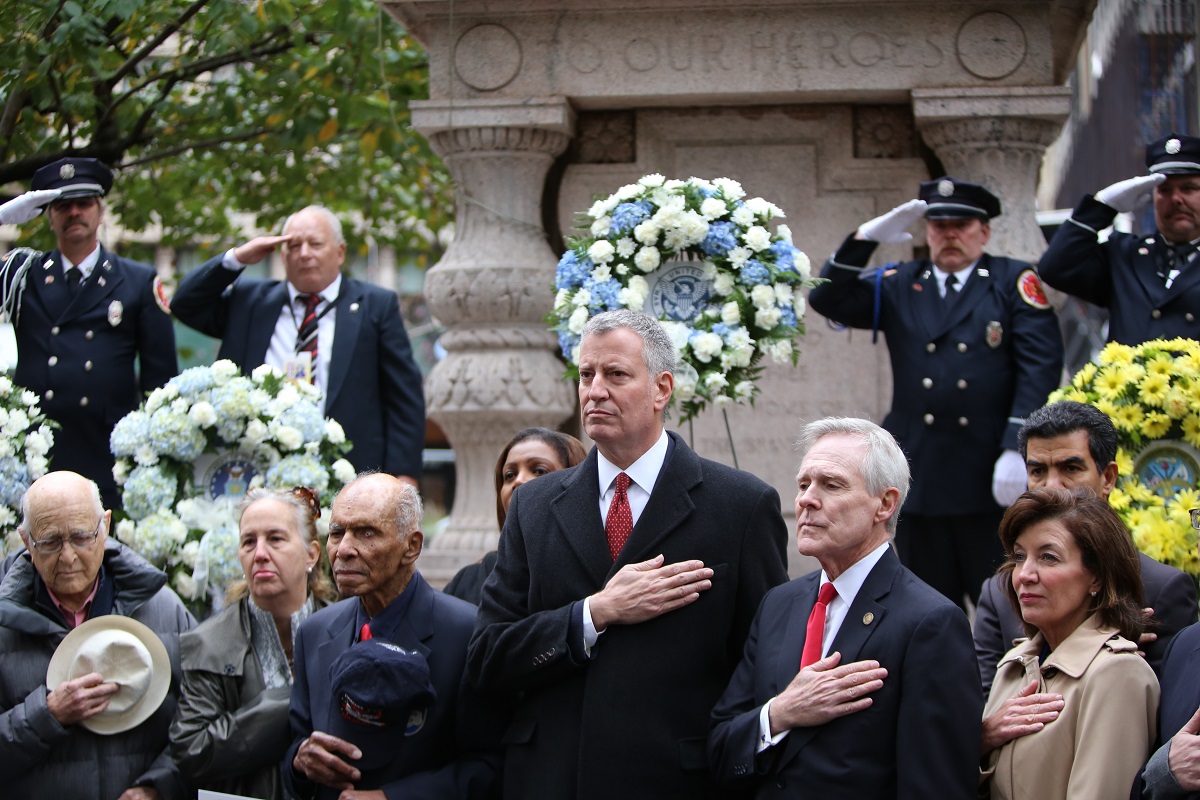
A commemorative speech aims to inspire the audience as they think about the life and achievements of a person at times such as their birthday, anniversary, or death. Commemorative speech examples show how to remember an event, company, or occasion.
A commemorative speech (also known as an epideictic or ceremonial speech) pays tribute to a person, a group, or an institution. It can also spotlight a momentous event that has happened in the past.
Public speaking and speech writing professionals usually deliver or write this type of speech during or for special occasions, such as anniversaries, graduations, retirement parties, memorial services, dedications, and award ceremonies.
Table of Contents
Why Are Commemorative Speeches Given?
Commemorative speeches can contain elements of an informative speech, persuasive speech, motivational speech, and even extemporaneous speech. However, the main purpose of this special occasion speech is to celebrate human values and, ultimately, spark inspiration and hope.
In a tribute speech , a type of commemorative speech, the aim is to commemorate the accomplishments of the subject and their impact on the community or society. In a eulogy , the highlight is the legacy and positive attributes of the deceased. In a retirement or graduation speech or a farewell speech, the piece emphasizes achievements and inspires the audience to look ahead with hopeful eyes. Meanwhile, an award acceptance speech spotlights the recipient’s feat and the people who helped them achieve it.
There are various types of ceremonial speeches. But by the end of effective commemorative speeches, speakers would want to uplift the audience’s emotions, making them feel optimistic about the future. Their goal is for the audience members to remember the things they’ve discussed on a good note and let their speech resound positively even well after they delivered their piece.
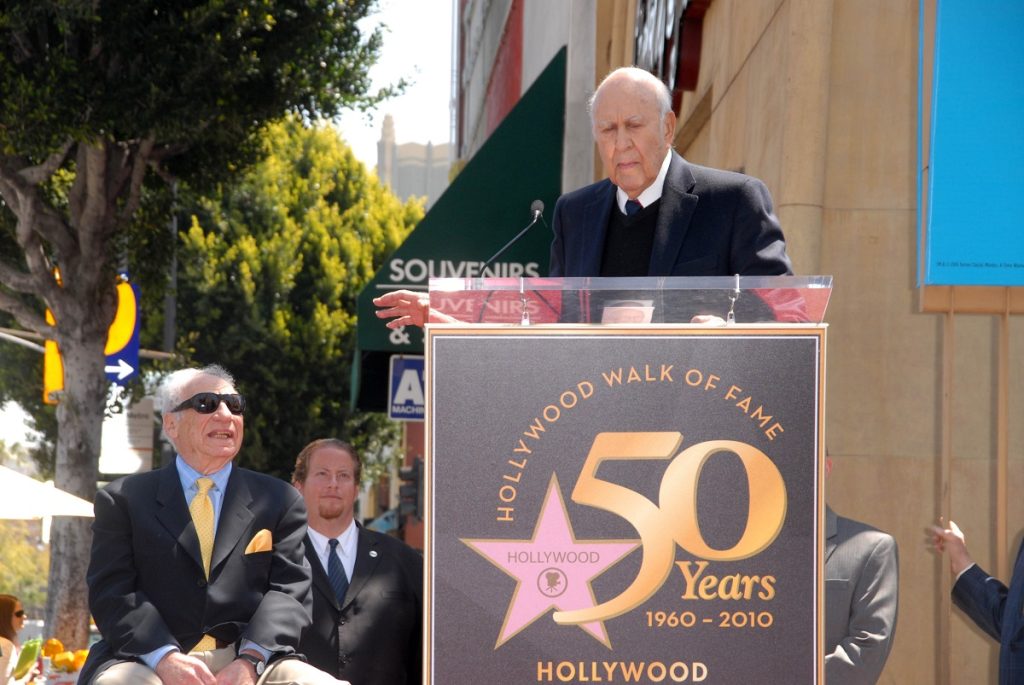
What Is The Structure Of A Commemorative Speech?
A commemorative speech outline follows the structure of just about any kind of speech. It has:
- An introduction. The intro presents your topic, its relevance, and your purpose. It’s also a suitable time to capture your audience’s attention.
- A body. After the intro, you will discuss your main points, complete with supporting proof (in the form of anecdotes, personal stories, expert opinions, and studies).
- A conclusion. A good commemorative speech ends with a conclusion summarizing the vital points you touched upon. Your goal here is for your audience to remember your core message.
How Do You Start A Commemorative Speech Example?
Writing commemorative speeches is challenging. After all, you’re tasked to hit a big goal: to celebrate something or someone and evoke positive feelings among the audience members.
You might ask: How do you begin writing a truly inspiring commemorative speech?
First, you must choose a theme in line with the person, group, institution, or event you’re commemorating. For instance, if you’re delivering a speech paying tribute to war comrades, your theme can be human courage and resilience.
Then, you can brainstorm with your peers for commemorative speech ideas. Doing such sessions will also help you gain insights into how you will frame your narrative in a way that cohesively conveys your key messages. Discussing your speech with others can also aid you in gathering perspectives and research materials to strengthen your speech’s impact.
Afterward, you can craft an outline following the structure above. Remember that you need to have a great attention-grabber in the intro. Whether you’re telling a story recounting a past happening, presenting a “what if” scenario, or stating an interesting fact, you intend to hook your audience to stay with you until the end. You can even use figurative language to help build a personal connection or creatively pique the audience’s curiosity.
What Is The Tone Of A Commemorative Speech?
There’s no definitive writing guide when it comes to the tone of a commemorative speech, as your piece will depend on the specific occasion and your relationship with the subject, among others. For instance, you can inject an appropriate sense of humor in a eulogy if you’re close with the deceased and the audience members.
However, generally speaking, your speech should have a positive tone. It should sound respectful, reflective, and inspiring.
What Does A Commemorative Speech Examples Cover?
While commemorative speeches follow the intro-body-conclusion template, many distinctive elements comprise this type of speech.
Throughout the speech, you can pepper your narrative with a personal touch, sharing stories, experiences, and memories relevant to the subject. This will help you humanize the topic and create a stronger, deeper personal connection with the audience.

In the speech, you must also cover the great qualities and milestones of the person, group, thing, or event you’re commemorating. The goal is not just to share their achievements and turn the limelight on their impact and influence. More importantly, you want these things to uplift your audience members and inspire them — and even yourself — to make their and your legacy.
In this speech by Katherine Gosvener, voted third best at Northwest University’s Advanced Speech course, she paid tribute to her deceased grandmother. Here’s how her introduction went:
“Anticipation fills the air as our old blue minivan turns onto LeFebvre Way, the street where grandparents live. Time seems to move a little slower as we pull up to the house my grandparents have lived in since their children were little, the house my grandfather built. It’s Spring, so the lawn has been mowed, and all the plants are green and beautiful. After we park the van, I step out and breathe in the fresh scent of flowers. As I look around, I see the source of the aroma: the gardenias my grandmother had planted, her favorite. Before we’ve even started walking toward the door, Grandma LeFebvre bursts through the front door with her usual greeting: ‘Hello There! Hello!'”
These are the memories that I have missed since my grandmother, Florence MacBurney LeFebvre, passed away two years ago on April 5, 2005.”
In the body , she brought up stories about flags, potato salad, and grandma’s love of the cowboy who became her grandfather that depicted the characteristics of her deceased loved one.
She concluded her piece with this powerful conclusion:
“The separation that her husband, children, and us grandchildren have experienced has been difficult. However, it is a comfort to remember that she became a Christian in a little church in Pinole 33 years before she passed away. I have great joy in the knowledge that someday, I will be reunited with her. I only hope that when I become an old woman, my husband can say that I am endearing, my children can say I’m an encouragement, and my grandchildren will know that I’m enamored with them. I know that when I reach the end of my days, she will be right there at the door of Heaven with the long-awaited greeting: ‘Hello There! Hello!'”
What Are Some Commemorative Speech Topics?
When selecting commemorative speech topics, you must choose something that genuinely matters to you. Even casual listeners can detect whether you’re speaking from the heart. So, make sure that your topic is something that you can authentically talk about.
Also, while you need not be an expert on it, you must have a sufficient understanding of your subject matter. It will help you confidently deliver your piece. Moreover, you must choose a topic that’s relevant to your audience.
Here are some topic ideas to kickstart your research and selection process.
- Your ultimate hero or mentor (it could be a family member or your high school teacher)
- A tribute to your favorite place
- A look at a loved one’s life and legacy
- Your childhood or upbringing
- Your family or marriage life
- Your career or dream job
- A prominent event in your neighborhood city
- An event that shaped your country
- A transformative movement (for example, the civil rights movement)
- A tribute to an important historical figure
- A tribute to someone who overcame a difficult challenge
- An example of positive human traits (e.g., hard work, loyalty, resilience)
What Are Some Famous Commemorative Speech Examples?
Finding inspiration for a commemorative speech is easy, thanks to the abundance of commemorative speech examples you can read online. Here are some of them.
Remarks by President Barack Obama at the Martin Luther King Memorial Dedication
“Our work is not done. And so, on this day, in which we celebrate a man and a movement that did so much for this country, let us draw strength from those earlier struggles. First and foremost, let us remember that change has never been quick. Change has never been simple or without controversy. Change depends on persistence. Change requires determination. It took a full decade before the moral guidance of Brown v. Board of Education was translated into the enforcement measures of the Civil Rights Act and the Voting Rights Act, but those 10 long years did not lead Dr. King to give up. He kept on pushing; he kept on speaking, he kept on marching until change finally came.”
Steve Jobs’s Commencement Speech at Stanford University
“Your time is limited, so don’t waste it living someone else’s life. Don’t be trapped by dogma — which is living with the results of other people’s thinking. Don’t let the noise of others’ opinions drown out your own inner voice. And most important, have the courage to follow your heart and intuition. They somehow already know what you truly want to become. Everything else is secondary.”
Oprah Winfrey’s Acceptance Speech for the Cecil B. Demille Award at the Golden Globe Awards
“I want all the girls watching here and now to know that a new day is on the horizon! And when that new day finally dawns, it will be because of a lot of magnificent women, many of whom are right here in this room tonight, and some pretty phenomenal men, fighting hard to make sure that they become the leaders who take us to the time when nobody ever has to say, ‘Me too’ again.”
Recent Posts
Active Listening Absorbs The Whole Message, Not Just The Words
Active listening goes beyond hearing the words someone is saying to you and understanding the message they are conveying. Many only hear a small percentage of what is being said as they are...
Counteracting Fear Of Public Speaking With Coaching And Therapy
Nearly 75% of people experience the social phobia of fear of public speaking. The result may be nervousness before speaking or a full-blown panic attack. Practicing public speaking may lessen the...
Speech And Debate
Commemorative Speech
Last updated on: Feb 9, 2023
Commemorative Speech: Guide to Craft an Engaging Speech
By: Cordon J.
Reviewed By: Chris H.
Published on: Sep 15, 2020

A commemorative speech is also known as a ceremonial speech. It is a type of speech given on a special occasion or event to celebrate a particular situation, event, or a person/group. It is mostly given to pay tribute or show gratitude towards an event, idea, or person.
By commemorating you inspire or give the audience hope for the future, boost their feelings and emotions.
To learn how to craft effective commemorative speeches, give this article a thorough read.

On this Page
What is a Commemorative Speech
As we mentioned earlier, a commemorative speech is a form of public speaking where the main purpose is to celebrate a particular thing.
Most students in the United States are asked to deliver an inspiring commemorative speech at the graduation ceremony. Here students express their gratitude towards their college, professors, family, classmates, etc.
For such occasions, you must write from the heart, reminiscing about the past and the important events. This kind of speech includes personal touch and the tips and tricks given here will help you write a speech successfully.
Commemorative speech requires a focus on the past, present, and future aspects of the topic. For instance, success, loyalty, wisdom, courage, hope, etc.
It can also be an award acceptance speech, or a eulogy to honor someone after their death. Now that you have understood the commemorative speech definition, let’s take a look and learn how to write a commemorative speech?

Tough Essay Due? Hire Tough Writers!
Commemorative Speech Outline
Just as any other piece of writing, a speech follows a particular outline and structure.
Begin the speech by stating the significance of your topic.
Make it interesting to grab the audience’s attention. If you’re talking about a person, share an interesting thing that they did or said. If your speech is about a particular event, discuss how it brings different people together, etc.
Your reason for paying tribute.
Why are you paying tribute to your subject and the kind of tribute? Why should they be honored and why at this particular event.
Highlight their achievements.
Next, talk about the contributions and accomplishments with examples and evidence.
Importance of these achievements.
Highlight the importance of these accomplishments, who benefits from them? How are these efforts valuable to us?
Make the audience empathize.
If talking about a person, make the audience think about how they can also become like that person, what practices can we learn and adopt?
In this section, the transition towards a brief summary of the speech. Share an anecdote or short story.
Commemorative Speech Examples
COMMEMORATIVE SPEECH EXAMPLE
COMMEMORATIVE SPEECH SAMPLE
How to Choose a Commemorative Speech Topic
When asked to deliver a commemorative speech for a class, you must first brainstorm different ideas that can be added to your speech.
Consider the following points in mind when brainstorming different topics:
Online Research
There is a list of commemorative speech topics available online. You can also find videos of previous commemorative speeches delivered at your school or by celebrities, etc.
Brainstorming potential ideas will enable you to come up with a topic relevant to you and your personal situation.
In order to make your speech and topic meaningful, think of the things you would want to share about the person. Or the information you want to share with others about a situation or event.
When thinking about the different stories to add, consider sharing that maybe you would want to hear in a commemorative speech.
If you are talking about a person then think of ways how you can share things about them respectfully, without offending them or anyone else.
Understand Your Audience
The most important ingredient that makes any piece of writing or speech work is the audience. It is they who decide whether or not the piece was worth it.
In order to ensure that you stay relevant to the audience, keeping in mind their interests and personalities and build your work around that.
Also, if you are going to mention someone directly in your speech you must be aware of the people who are going to be there.
Convey a Meaningful Message
A commemorative speech is a type of informative speech where the aim is to inform the listener about a particular topic. Although the main goal is to praise or commemorate something, your message must be clear and meaningful throughout the rest of the speech.
A speech writing guide will help you create an impactful and impressive speech.
Paper Due? Why Suffer? That's our Job!
Commemorative Speech Topics
There are several different categories of commemorative speech ideas depending upon the event or occasion.
Here are some of our best suggested commemorative speech ideas that you can choose from:
- Paying tribute to a family member
- Paying tribute to an important personality, dead or alive (Martin Luther King, Barack Obama)
- Paying tribute to a big movement (Women's rights movement, the civil rights movement)
- Celebrating the values of a religion (Buddhist values)
- Speak on the importance of hope (NASA's Apollo 13 survival mission)
- Celebrate human courage, or a courageous act in a challenging situation by policemen, firefighters, veterans
- Selflessness of a teacher or parent, their dedication and love
- An act of compromise that marked the start of you becoming a mature and evolved person
- Show respect to the greatest travelers that ever lived (Christopher Columbus, Vasco da Gama)
- Eulogy for a professor at your college
- Speak about your transformation both spiritually and intellectually after starting college
- The series of events that lead to you and your classmates becoming a family
- A time you and your team won a match due to the support of the College
- Provide an example of loyalty by discussing war comrades
- What does freedom mean to you?
- Commemorate the lives lost on 9/11
- Celebrate the legalization of gay marriages
- Queen Elizebeth and her life
- Buying your first house
- Remembering your grandmother
- Women who changed the world for the better
- Father of the bride speech
- Maid of honor speech
- Best technology inventions
Here is a little activity for you to clarify the concept of commemorative speech. Which of the following is an example of a commemorative speech?
- A speech that demonstrates how to plan a wedding.
- A speech honoring the life of Martin Luther King.
- A speech telling the people where they can find the work of Vincent Van Gogh.
- A speech for the school board to get funding for the school dance.
These were some of the topics for a commemorative speech just to give you an idea of what direction to think in. You may use these topics as is, or brainstorm staying on this track and you'll have an inspiring topic to talk on.
If you are unable to come up with an engaging topic, feel free to reach out to the expert writers at 5StarEssays.com .
Request an essay for me ! Enjoy a well-crafted commemorative speech at the most affordable prices and leave everyone in awe.
Frequently Asked Questions
What is the goal of a commemorative speech.
A commemorative speech is delivered to inspire the audience and to pay tribute to a person. It highlights the qualities and works of the person.
Is eulogy a commemorative speech?
A eulogy is a kind of commemorative speech and it also includes other kinds of speeches also.

Cordon. is a published author and writing specialist. He has worked in the publishing industry for many years, providing writing services and digital content. His own writing career began with a focus on literature and linguistics, which he continues to pursue. Cordon is an engaging and professional individual, always looking to help others achieve their goals.
Was This Blog Helpful?
Keep reading.
- How to Write a Speech - Outline With Example

- Informative Speech Topics - Interesting Ideas By Experts

- Persuasive Speech Topics - 150+ Topics for Students

- 50+ Demonstration Speech Ideas for Your Next Great Speech

- Impromptu Speech Topics - 150+ Interesting Ideas

- Debate Topics (2024) - Top 200+ Compelling Topics

- 100+ Motivational Speech Topics for an Inspirational Speech

- Extemporaneous Speech - How to Write One Successfully?

- Graduation Speech - Write Your Best Graduation Speech

People Also Read
- write character analysis
- how to write a rhetorical analysis essay
- compare and contrast essay
- 40 best argumentative essay
Burdened With Assignments?

Advertisement
- Homework Services: Essay Topics Generator
© 2024 - All rights reserved
Speech Writing
Commemorative Speech
Last updated on: Dec 31, 2023
Commemorative Speech - Writing Guide, Outline & Examples
By: Donna C.
Reviewed By: Chris H.
Published on: Jan 4, 2023

Giving a commemorative speech can be a great way to honor someone or something important to you. It can also be a great opportunity to share your experiences and feelings about the person or event you are commemorating.
Are you giving a commemorative speech for the first time and afraid of public speaking? This guide is for you!
We will walk you through the basics of writing, outlining, and delivering a commemorative speech.
Additionally, we will provide some examples of successful speeches in order to help inspire you. So whether you're preparing to give a speech for the first time or simply looking for ideas, read on!

On this Page
Commemorative Speech Definition
A commemorative speech is a special speech given at a ceremony that praises the value of a person, place, event, idea, or institute.
This speech is more than just a verbal compliment, it's an expression of gratitude and acknowledgement.
The purpose of writing this speech is to:
- Give your audience a sense of hope for the future.
- Uplift the emotions and feelings.
- Motivate the audience about a personality, event, or idea.
- Provoke sentiments and express feelings.

Paper Due? Why Suffer? That's our Job!
A commemorative speech can mark an anniversary, a funeral, or a memorial service. It’s also used at award ceremonies when someone accepts an honor.
In a nutshell, a commemorative speech unites and inspires people to remember and appreciate an achievement.
To write a good commemorative speech, you must highlight the positive aspects of an event.
How to Start a Commemorative Speech?
Commemorative speeches are not any different from other pieces of work. You need to prepare properly if you want yours to be effective on the final day.
Take the following steps to start your commemorative speech.
1. Brainstorm Ideas To start a commemorative speech you need to think of ideas to write the address. Keep in mind the subject and make sure to cover significant aspects that are worth discussing.
Identify five "Who," "What," "When," "Where," and "Why" questions about the topic. This can help to develop a commemorative speech topic.
When delivering your speech about a person, choose an activity that portrays the person’s values. This activity should also shows off that person's worth, and rouses emotions in the audience.
2. Identify The Purpose Before beginning your speech remember to identify why you are being chosen to pay a tribute and the speech’s purpose. Present all the reasons behind the occasion and personalities involved in your commemorative address.
3. Collect Important Information Before giving a commemorative speech, ensure you collect information that is important to share with the audience. This includes any memories or stories that you would like to share with the audience.
Commemorative Speech Outline
Organizing all this information could be a challenge. To make the content easier to understand, an outline is created. The outline provides a framework for speech preparation.
To help you write your speech, a commemorative speech outline consists of three parts:
- Introduction
The speech introduction should be brief and include a representation of the ceremony's purpose and the speaker's role.
In the body of your speech you will organize all the information you want to share about your subject.
It is advisable to summarize the main points of your speech after it’s done. It will help the audience to remember the speech’s central purpose.
Commemorative Speech Outline Template
Here is a sample template that will help you organize your speech:
How to Write a Commemorative Speech
Once you have gathered all the necessary information, you are ready to write your speech. Follow these steps to create a touching commemorative speech:
- When you are giving a commemorative speech, open your speech with a catchy hook. A hook is an opening sentence of the introductory paragraph. Cheer up your audience by starting out with an interesting question, a personal anecdote, or a funny joke.
- After writing the hook, give a brief introduction. Give them a glimpse of the subject and purpose of your presentation. An introduction should draw your listeners into what you will be discussing. It also tells your listeners about the topic and lets them know why the topic is important.
- Your speech can be remembered for highlighting the subject’s achievements, loyalty, wisdom, remarkable actions, and significance. You can accomplish this by sharing success stories and other experiences in your body paragraphs.
- Make the audience feel connected to the subject of your speech. Keep in mind that a commemorative speech should be personal so you must write from the heart.
- Finally, mention the major points and how the subject relates to you in the present and future.
- When you are done, review the finished product to check for any grammar mistakes, as well as word choices that are off-the-mark.
Tough Essay Due? Hire Tough Writers!
Commemorative Speech Topics
Choosing the right topic will add charm and magic to any speech. Also, your topic is the first thing your audience will see, so make it interesting. The following are some ideas for topics:
- A tribute to a loving spouse
- A tribute to caring parents
- The sacrifice of a teacher
- A perfect example of human courage
- A human who overcame a challenge
- Celebrating Islamic values
- Praising the women’s rights movement
- Respect makes any relationship better
- Hard work is the only shortcut to success.
- Teamwork improves the performance of organizations.
- Leadership is an innate ability.
Commemorative Speech Examples
When you’re giving a speech, be sure to use the best inspirations and previous examples.
The examples listed below can give you great ideas for your speech.
Graduation Commemorative Speech Example
Commemorative Speech Example
Tips to Write a Commemorative Speech
If you write a speech for the first time, here are some tips that can help you make it powerful and compelling.
- When writing a commemorative speech, the first thing you should think about is showing the audience how grateful you are. The words and tone you use should reflect your feelings and sense of appreciation.
- Brainstorm topic ideas for your speech. Think of ways to relate to your audience and engage them.
- Don't just choose a random topic. Make sure that it has some kind of message and is full of feelings.
- Choose an appropriate topic for your audience. If your speech is to fellow students, choose a subject that students are interested in. In a commemorative speech, choose words that are clear and easy for everyone to understand.
- Write your speech in a way that is both interesting and informative for the listeners.
- Don't just restate what the audience already knows; share new information and ideas.
Writing inspiring talks is a challenge, but once you know what to say and how to structure your talk, the process becomes easier. If writing is not your forte and you don’t have time to produce an inspiring speech yourself, you can always buy a speech written by an expert.
Writing an inspirational speech can be overwhelming. However, if you spend some time planning the speech it becomes much easier.
But, if you still find it hard to structure your speech, you can always purchase a well-written speech from a professional.
SharkPapers.com has a team of writing professionals that has years of experience of providing exceptional writing help. They can provide customized content for speeches, essays, reports, research papers, term papers, and many more.
Order today to receive an affordable speech delivered directly to your inbox.

Education, Marketing
Donna writes on a broad range of topics, but she is mostly passionate about social issues, current events, and human-interest stories. She has received high praise for her writing from both colleagues and readers alike. Donna is known in her field for creating content that is not only professional but also captivating.
Was This Blog Helpful?
Keep reading.
- Learn Speech Writing - Tips And Tricks

- Farewell Speech - Saying Goodbye with Style

- What Does Acceptance Speech Mean? Find Now Here

- Writing a Great Graduation Speech: Outline, Tips & Ideas

- Extemporaneous Speech | Intro, Examples, and Tips

People Also Read
- thematic statement
- scholarship essay
- press release example
- research paper writing
- ieee citation
Burdened With Assignments?

Advertisement
© 2024 - All rights reserved
2000+ SATISFIED STUDENTS
95% Satisfaction RATE
30 Days Money Back GUARANTEE
95% Success RATE
Privacy Policy | Terms & Conditions | Contact Us
© 2021 SharkPapers.com(Powered By sharkpapers.com). All rights reserved.
© 2022 Sharkpapers.com. All rights reserved.
LOGIN TO YOUR ACCOUNT
SIGN UP TO YOUR ACCOUNT
- Your phone no.
- Confirm Password
- I have read Privacy Policy and agree to the Terms and Conditions .
FORGOT PASSWORD
- SEND PASSWORD
Crafting Touching Commemorative, Special Occasion Speeches
Table of contents
- 1 What is a Commemorative Speech
- 2.1 Speeches of Introduction
- 2.2 Acceptance speeches
- 2.3 Speeches of Dedication
- 2.6 Eulogies
- 2.7 Farewell Speech
- 2.8 Commencement Speeches
- 2.9 After-Dinner Speeches
- 2.10 Motivational Speeches
- 2.11 Speeches to Ensure Goodwill
- 3 How to Make Your Speech Commemorative
- 4.1 Tribute Speech Ideas
- 4.2 Commemorative Speech on a Famous Person
- 4.3 Dedication Speech Ideas
- 4.4 Commemorative Speech Topics for College Students
- 5 Commemorative Speech Example
Crafting a memorable commemorative speech can often feel like navigating a complex maze. This comprehensive guide demystifies the process, offering practical advice on creating a speech that resonates with emotion and significance. Whether you’re honoring a renowned figure, celebrating a milestone, or delivering a dedication, this article serves as your go-to resource.
Explore the essence of what makes it truly commemorative, delve into a rich array of topics tailored for diverse occasions, and discover how to infuse your speech with the right blend of tribute and inspiration. From students seeking captivating topics for college presentations to anyone eager to pay homage through words, this guide has it all. Plus, get inspired by a carefully curated example that exemplifies the art of commemorative speech.
Elevate your speaking skills and make your next speech not just a message but a lasting memory. Click to read more and embark on the journey of mastering the art of commemorative speech.
What is a Commemorative Speech
At its core, a commemorative speech celebrates values, ideas, and people, weaving a tapestry of words that capture the essence of its subject. Unlike other ceremonial speech topics that might focus on informing or persuading, commemorative speeches aim to inspire and evoke emotion. They highlight the significance of events, achievements, or individuals, leaving an indelible impression on the audience. This genre encompasses a wide range of themes, from honoring historical figures to commemorating personal milestones. The key lies in selecting topics that resonate deeply with the audience, enabling the speaker to create a connection through shared values and experiences.
Additionally, these speeches often incorporate storytelling, transforming facts and figures into compelling narratives. By doing so, they not only inform but also engage the audience, making the occasion memorable and impactful. Crafted with care and delivered with sincerity, these speeches become powerful tools for reflection, motivation, and celebration, turning ordinary moments into memorable celebrations.
Some Common Types of Special Occasion Speeches
Special occasion speeches come in many different forms, each serving a unique purpose and possessing its distinct style. This section delves into the different types of special occasion speeches and gives you a comprehensive rundown of their key elements. Some special occasion speech examples are as follows:
Speeches of Introduction
A speech of introduction is basically a brief speech which serves as the introduction for an upcoming speaker. The host of the event typically delivers it to introduce another speaker. The content of the introductory speech is usually centered around the person being introduced. In the content, you can mention if the speaker has written books on the subject or has had special life events. The introduction must capture the audience’s attention and create excitement. The speech’s conclusion should welcome the main speaker to the stage, building anticipation and creating positive energy for the main speaker’s speech.
Acceptance speeches
An acceptance speech is a formal address delivered by the recipient of an award, recognition, or honor. Its purpose is to express gratitude and appreciation for the award. This speech provides an opportunity for the recipient to reflect on their achievement and share personal experiences and lessons learned along the way.
For a well-written and effective acceptance speech, it should contain the following elements:
- Thanking those who presented the award and expressing gratitude for the recognition.
- Acknowledging those who helped in achieving the award or goal.
- Providing a personal perspective on the award by explaining its significance to the recipient.
- Free unlimited checks
- All common file formats
- Accurate results
- Intuitive interface
Speeches of Dedication
A speech of dedication is a formal address given on special occasions to recognise or dedicate an object or event. The goal of the address is to commemorate the occasion and highlight its significance while also remembering all those who participated in the project. Examples of such events include naming a building, opening a new store, placing a plaque, or completing a library. When delivering a dedication speech the keynote speaker should adopt a celebratory and respectful tone to honour the event. The key components of a successful speech include the following:
- Establish your connection to the event by sharing personal experiences or relationships.
- Describe what is being dedicated, including its history and importance.
- Recognize everyone involved in the project, such as those who initiated, funded, and completed it.
- Emphasize the impact the dedication will have on the community, for example, by highlighting new job opportunities created by a new store.
The fourth special occasion speech is a toast. A toast is a short speech during special and personal events like weddings, anniversaries, birthdays, or even career milestones like a new job or promotion. The purpose of a toast is to congratulate, admire, or remember someone and show gratitude or appreciation. Toasts typically last around 30 to 60 seconds and involve raising a glass of wine, champagne, or any other beverage. As the glass is raised, the speaker offers congratulations, praise, and well wishes, creating a memorable moment and setting the tone for the rest of the event.
Roasts is a very interesting yet peculiar speech, where the speaker makes lighthearted and playful jabs at a person in a way that’s meant to entertain the audience. You must have watched some of the roasts conducted by the television station Comedy Central. When preparing for a roast, it’s crucial to strike a balance between humor and respect. Start by getting to know the person you’ll be roasting, familiarise yourself with their quirks, and any well-known stories you can playfully rib them about. Avoid bringing up sensitive or private information that may make the person uncomfortable. Keep your audience entertained and engaged throughout the speech, and end on a positive note.
A eulogy is a touching tribute to someone who has recently passed away. It’s a speech given during the funeral or memorial service to honour the deceased and celebrate their life. The eulogy should highlight the remembered person’s special moments, relationships, and achievements. The goal is to bring comfort to those grieving and share the person’s story in a meaningful way. Delivering a eulogy is a privilege, but it can also be a challenging task. Tributes can be lighthearted, nostalgic, or a mix of different emotions. Personal anecdotes and reflections can add a deeper emotion to the speech and help bring the person’s story to life. Humorous moments can also help to ease the tension as its a serious and sad occasion. Writing a eulogy is a cathartic experience and can be an important part of grieving. It’s a time for friends and family to come together and support each other in their loss.
Farewell Speech
A farewell speech is a way of bidding goodbye to someone as they move on to a new phase in life. This type of speech is usually given by a colleague, boss, or friend to pay tribute to the person’s contributions and achievements. Whether leaving a job or graduating, farewell speeches celebrate the transition and mark new beginnings.When giving a farewell speech, preparing and choosing your words carefully is important. Avoid negativity and aim to express positivity, respect, and gratitude. The address is a chance to reflect on the past and look forward to the future, and it should be focused on expressing best wishes to the person moving on.

Commencement Speeches
A Commencement Speech is a special address given to acknowledge the accomplishments of a graduating class. A great commencement speech signifies the end of an era for the students and allows the commencement speaker to reflect on the lessons learned and experiences gained. Speakers deliver commencement speeches to inspire and motivate the graduates as they embark on a new life chapter. Commencement speech addresses should include some key points to make it a memorable experience for you and the audience. Some common commencement speech themes include leadership and self-improvement. Make the speech personal and heartfelt by sharing your lessons and experiences. Add humour to engage and make the young audience laugh, but keep the content concise and to the point.
After-Dinner Speeches
An after-dinner speech is common in formal gatherings and events. After dinner, speakers address after a meal, and the purpose is to end the evening while engaging and entertaining the audience. A successful after-dinner speech makes use of the chance to promote a positive atmosphere in the room. The tone of the speech can be casual, as the text usually includes anecdotes, personal remarks, and light commentary to make the speech humorous. The content, however, should be crafted to build a sense of community amongst the event attendees and any kind of humorous remarks should be modest.
Motivational Speeches
Motivational speech is a type of inspirational speech crafted motivate listeners to pursue their aspirations and take action towards their goals. It is a highly specialised form of persuasive speaking commonly delivered at schools, or clubs and even religious centres. The purpose of the address is to boost confidence and offer a fresh perspective on life. The speaker must convey intensity, persistence, and conviction through their words and delivery. Successful individuals who have overcome challenges and achieved great things are often the ones who deliver motivational speeches. The format of the address can vary, but it has the potential to impact the lives of the listeners deeply.
- Familiarise yourself with your audience
- Clearly define the issue
- Provide a solution
- Use vivid examples
- Encourage action
- Speak with conviction
Speeches to Ensure Goodwill
Speeches of goodwill promote unity and cooperation between groups, communities, or even individuals. The lessons are delivered with good intentions; goodwill is an asset representing a positive image of a person or even an organisation. Speeches of goodwill are usually given out at public gatherings or events. The purpose is to build bridges and remove any grievances or misconceptions. Some important examples of speeches of goodwill are discussed as follows:
Speeches of Apology Apology speeches are public statements made when an individual or organisation wishes to express regret for past actions or behaviour. The goal of the speech is to acknowledge any wrongdoing and apologise for any harm caused. For an apology speech to be effective, it must also include a plan for making amends and steps to rectify the situation. This goodwill speech is important for diffusing tensions and avoiding further conflicts. When making an apology speech, it’s crucial to ensure that the tone is heartfelt and the expression of regret is prominently included in the content.
Speeches of Justification The second type of speech of goodwill is the speech of justification. These are given to defend a course of action or explain a decision made by an individual or organisation. Typically the speaker explains evidence and reasoning to support their arguments and persuade the audience. These speeches are commonly made in politics and business to justify a controversial decision, a policy change, or a new initiative. For a speech of justification to be effective, it is important for the speaker to have a thorough understanding of the topic and to present their argument clearly and convincingly. It is also crucial to consider the audience’s perspective and address any objections or concerns they may have.
Speeches on Public Relations Public relations speeches are the third type of speech of goodwill aimed at enhancing the image of a speaker or organisation in the eyes of the public. The objective of these speeches is to maintain or improve reputation. They are crafted to present a positive image to the public and address any negative perceptions. For a public relations speech to be successful, it must be well-prepared and tailored to the specific audience.
How to Make Your Speech Commemorative
How to write a commemorative speech? Making it truly commemorative involves more than just choosing the right topics. It’s about infusing your words with meaning and relevance. Start by understanding the commemorative speech definition: a presentation meant to celebrate, remember, or pay tribute. To write a commemorative speech, focus on creating an emotional connection. Select topics that not only resonate with your audience but also stir their hearts. These could range from historical milestones to personal achievements, each requiring a unique approach.
It should weave together narrative and fact, painting a vivid picture that brings your subject to life. Use commemorative speech ideas that are both imaginative and grounded in reality, striking a balance between creativity and authenticity. Personal anecdotes, poignant quotes, and relevant statistics can help illustrate your points, making your speech not just informative but also deeply moving. Remember, the goal is to leave your audience feeling inspired and connected to the theme, making your speech a memorable part of their experience.
Commemorative Speech Topics
Selecting an appropriate topic is essential for crafting an impactful commemorative speech. Whether delivering a speech to honor someone special, brainstorming celebratory speech ideas, or exploring various types of commemorative speeches, the key is to choose a theme that reflects the occasion’s significance and resonates deeply with the audience. A well-chosen topic not only captivates listeners but also ensures that your speech leaves a lasting, meaningful impression.
Tribute Speech Ideas
Within this section, you’ll find a diverse array of themes designed to guide you in crafting tribute speeches that truly resonate with your audience. These ideas transcend the mere act of speaking and delve into the art of paying homage to individuals who have made profound impacts on our lives. Whether you’re honoring a beloved teacher, a local hero, or a family member, these concepts will help you elegantly celebrate their achievements and cherished legacies, leaving a lasting impression on your listeners.
- Celebrating a Local Hero’s Acts of Courage
- Honoring a Teacher’s Lifelong Dedication to Education
- Tribute to First Responders in Crisis Situations
- Remembering a Pioneering Environmental Activist
- Saluting a Veteran’s Service and Sacrifice
- Commemorating a Groundbreaking Scientist’s Discoveries
- How to Start a Commemorative Speech: Honoring a Community Leader
- Reflecting on an Artist’s Influence on Modern Art
- Recognizing a Mentor’s Impact on Personal Growth
- Paying Homage to a Cultural Icon’s Legacy
- A Tribute to a Family Matriarch or Patriarch
- Celebrating an Author’s Contribution to Literature
- Honoring a Pioneer in Medical Research
- Appreciating a Philanthropist’s Generosity and Vision
- Acknowledging a Sportsperson’s Career and Sportsmanship
Commemorative Speech on a Famous Person
Step into the fascinating world of renowned figures with these ideas. Each topic within this section offers a unique opportunity to explore the extraordinary lives and contributions of famous personalities. From groundbreaking scientists to influential artists, these speeches are a testament to the power of storytelling and the enduring legacy of those who have left an indelible mark on society. Whether you’re commemorating their achievements or reflecting on their enduring influence, these topics provide a rich tapestry of narratives to inspire your audience.
- The Life and Legacy of Nelson Mandela
- Reflections on Martin Luther King Jr.’s Dream
- Commemorative Speech Outline Format: Albert Einstein’s Scientific Contributions
- Marie Curie: A Legacy of Discovery and Perseverance
- The Artistic Genius of Frida Kahlo
- The Enduring Influence of Mahatma Gandhi
- Celebrating the Innovations of Steve Jobs
- The Musical Impact of Ludwig van Beethoven
- The Humanitarian Efforts of Mother Teresa
- The Inspiring Journey of Malala Yousafzai
- Remembering the Wit and Wisdom of Mark Twain
- Celebrating the Athletic Excellence of Muhammad Ali
- The Cinematic Legacy of Alfred Hitchcock
- Reflecting on the Life of Princess Diana
- The Literary Contributions of Jane Austen
Dedication Speech Ideas
When it comes to dedicating places, events, or individuals, these ideas offer a thoughtful and balanced approach. They provide a framework for speeches that are both reverential and celebratory, making them perfect for special occasions and moments of significance. Whether you’re unveiling a new community center, launching a scholarship, or inaugurating a historical museum, these topics will help you strike the right chord and create a memorable experience for your audience.
- Commemorative Speech Topic Ideas: Unveiling a New Community Center
- Dedication of a Memorial Garden
- Launching a Scholarship in Someone’s Honor
- Opening Ceremony of a Historical Museum
- Dedication of a New School Building
- Unveiling a Public Art Installation
- Naming a Street after a Local Leader
- Inaugurating a Research Facility
- Dedication of a Local Park or Nature Reserve
- Launching an Annual Cultural Festival
- Commemorating a New Business Venture
- Inauguration of a Charity Foundation
- Dedication of a Community Library
- Opening of a Health Clinic in a Rural Area
- Unveiling a Technology Innovation Hub
Commemorative Speech Topics for College Students
Engaging college students requires themes that resonate with their unique experiences and aspirations. The topics in this section are carefully curated to address the interests and concerns of young adults entering the academic world. From exploring societal issues to delving into the latest technological advancements, these themes are designed to inspire and captivate the minds of college students, fostering critical thinking and meaningful discussions in educational settings.
- Topics for Commemorative Speeches: Social Media’s Impact on Communication
- The Role of Youth in Environmental Conservation
- The Evolution of Feminism and Its Impact
- Celebrating Cultural Diversity on Campus
- The Influence of Technology on Modern Education
- The Legacy of Historical Movements for Civil Rights
- The Rise of Entrepreneurship in the Digital Age
- Commemorating Innovations in Science and Technology
- The Importance of Mental Health Awareness
- The Impact of Globalization on World Economies
- Celebrating Artistic Expression in Various Cultures
- Good Commemorative Speech Topics: The Role of Sports in Promoting Unity
- The Future of Renewable Energy Sources
- The Influence of Literature on Society
- Reflections on the Evolution of Music Genres
Commemorative Speech Example
Here is one of the commemorative speech examples:
Ladies and gentlemen, Today, I stand before you not just to speak, but to celebrate the enduring spirit of an extraordinary individual, Jane Doe. In our journey through life, we cross paths with many, but only a few leave an indelible mark on our hearts and minds. Jane is one such remarkable person. As a dedicated teacher, Jane didn’t just educate; she inspired. Her classroom was a sanctuary of learning, where curiosity was kindled and dreams were nurtured. She believed that every student could achieve greatness, and she devoted her life to turning that belief into reality. Her impact extends beyond the confines of the classroom, touching the lives of countless individuals. Jane’s approach to teaching was a blend of compassion and rigor. She challenged her students to think critically, to question, and to explore. Her lessons went beyond textbooks; they were life lessons about resilience, respect, and the pursuit of excellence. Jane’s legacy is not just in the knowledge she imparted, but in the confidence and character she built in her students. In commemorating Jane, we celebrate not just a teacher, but a mentor, a guide, and a beacon of hope. Her commitment to education and her unwavering spirit have left an indelible mark on the community. She has shown us that the true value of teaching is not in the information shared, but in the lives transformed. As we gather here today, let us remember Jane Doe not just for her achievements, but for her heart – the heart of a teacher who believed in the power of education to change the world, one student at a time. Her legacy will continue to inspire and guide future generations. Thank you, Jane, for your immeasurable contributions. Your spirit lives on in every life you’ve touched. In these words, we find the essence of what makes a commemorative speech. It’s a celebration of life, a recognition of impact, and a testament to enduring influence.
Readers also enjoyed

WHY WAIT? PLACE AN ORDER RIGHT NOW!
Just fill out the form, press the button, and have no worries!
We use cookies to give you the best experience possible. By continuing we’ll assume you board with our cookie policy.
My Speech Class
Public Speaking Tips & Speech Topics
Commemorative Speech

Jim Peterson has over 20 years experience on speech writing. He wrote over 300 free speech topic ideas and how-to guides for any kind of public speaking and speech writing assignments at My Speech Class.
Commemorative speech topics tutorial including seven examples on what you could deliver as observation, memory, monument in words or even celebrate in an salut:
Focus on the values of life and past, present, and future of society. For example hope, trust, kindness, courage, loyalty, wisdom, disappointment, camaraderie, dignity, success, and tradition are good public speaking speech topics.
It is a ceremonial address of honor and celebration of the values of a person, group, an institution, a place, event, idea or subject. It’s more than a tribute verbal testimonial that celebrates achievements or essential accomplishments.

- To give the audience hope for the future.
- To uplift the listeners’ feelings and emotions.
- To heighten their admiration for the person, group, institution, event or idea being praised.
- To express feelings, arouse sentiments.
A special form is the eulogy including commemorative speech topics to praise and honor a person who died.
Use this list below to tickle your imagination. It will help you effectively to sort out, organize and plan in advance spare thoughts. Answer all the questions that are appropriate to you.
And apply the answers to your subject, the occasion and the feelings of the public. In fact it is an praising example.
Can We Write Your Speech?
Get your audience blown away with help from a professional speechwriter. Free proofreading and copy-editing included.
This commemorative idea is meant to grab the attention and achieve feelings of recognition right at the start of your commemorating speech. Some ideas for a tribute:
- a person – Describe how the person you honored always takes care of the pets in your neighbourhood
- a place – Describe the natural world wonder you commemorate, and how it inspires thousands of visitors to protect nature in their local community.
- an event – Describe how the Superbowl unites many fans, what happens at the big day, what it means to them.
- a group – Describe that the baseball team being honored became champion because of their co-operation.
- Why does your subject deserve to be honored?
- Why this kind of tribute?
- Why at this moment, why at this occasion?
- Refer to the particular contributions, achievements or merits. Give concrete examples. E.g. What has been accomplished, in what way?
- Build in commemorative speech topics describing why the efforts, impressions, achievements are such a success.
- Who or what will benefit?
- Why is this way of thinking or acting valuable to us?
- What specific values can we distract and which ones make the difference
- How can we also apply the values?
- Why do we need to apply them too?
Describe the values in such a way that all attendees can empathize and re-experience these feelings. If the commemorated subject is a person, then ask yourself for example: what can we learn of the subjects’ way of approaching things in his personal or professional life?
- Link the previous commemorative speech topics of the important values to the common feelings and thoughts that you and the audience share.
- Illustrate them with a short story, anecdote, facts or a testimony of a symbolic personal experience with the subject.
- Conclude with a memorable summary of the commemorative speech topics you have been talking about. Help the audience members to remember your main message.
Especially emphasize the values that are being celebrated in you talk. Use a attention getting oneliner that captures the whole idea.
Finally, I list here the three most important tips about this type of speechwriting and on delivering. They are about the language and the style of the presentation:
- Use expressive and elegant language.
- Formulate in an eloquent serious style.
- Avoid exaggerating expressions in your commemorative idea.
Multifunctional Checklist
I. GENERATE FEELINGS OF RECOGNITION BY TELLING ABOUT:
a. Iconographic or key activities, feature or aspects?
• person: • group: • event: • place:
b. Values and merits?
c. Highlights?
d. Achievements and accomplishments?
e. Particular contributions?
f. The character or features?
II. NOW FILL IN EXAMPLES IN THIS COMMEMORATIVE SPEECH TOPIC CHECKLIST:
a. Short story? b. Anecdotes? c. Facts? d. Testimonies? e. Related personal experiences?
III. MAKE A TIE TO THE AUDIENCE IN YOUR COMMEMORATION SPEECH TOPIC
a. Can you tie the examples noted above to the common feelings and thoughts of your audience? b. Why should we honor her or him? c. In what way are the points mentioned above in I. valuable to us? d. What can we learn from the person’s behavior or the features? e. In what way could we benefit or what are advantages?
IV. WHAT SHOULD WE DO TO APPLY?
a. In case of a person: How can we act like the honored person does/did? b. How can we improve our efforts? c. Is there a way of approaching things that we could alter?
How To Use This Commemorative Speech Checklist?
- Fill in empty spaces where you think it’s suitable for the occasion, the contents of your inspiring tribute commemorative speech topic.
- Fill in rough clues, note them in short keyword sentences. Not more for this moment.
- Sort out the things you’ve written in the speech outline.
- Write your commemorative address. Keep focused on:
- First, establish recognition, mention situations and moments everyone recognize;
- Second, examples, proof, evidence. Reason(s) why we honor and celebrate, and learn from her/him/it;
- Third, tie to the audience;
- Fourth, things your listeners should do. The action step at the end.
Graduation Speech [20 Examples + Template]
Wedding Speech [Topics + Template]
Leave a Comment
I accept the Privacy Policy
Reach out to us for sponsorship opportunities
Vivamus integer non suscipit taciti mus etiam at primis tempor sagittis euismod libero facilisi.
© 2024 My Speech Class
- Games, topic printables & more
- The 4 main speech types
- Example speeches
- Commemorative
- Declamation
- Demonstration
- Informative
- Introduction
- Student Council
- Speech topics
- Poems to read aloud
- How to write a speech
- Using props/visual aids
- Acute anxiety help
- Breathing exercises
- Letting go - free e-course
- Using self-hypnosis
- Delivery overview
- 4 modes of delivery
- How to make cue cards
- How to read a speech
- 9 vocal aspects
- Vocal variety
- Diction/articulation
- Pronunciation
- Speaking rate
- How to use pauses
- Eye contact
- Body language
- Voice image
- Voice health
- Public speaking activities and games
- About me/contact
- Tribute speech guide
Tribute speech guide
- how to prepare a sincere commemorative speech.
By: Susan Dugdale | Last modified: 04-18-2021
A tribute speech belongs in a special category of speeches called commemorative. Its principal purpose is to inspire and celebrate; uniting listeners in sincere, heartfelt gratitude and admiration for its subject.
Have you been asked to prepare a tribute speech and need to know more?
What you'll find on this page
- what occasions are most likely to call for a tribute speech
- the characteristics of a tribute speech
- how to begin the process of writing a tribute speech
- how to choose a topic
- information about eulogies or funeral speeches, (a special type of tribute speech), with links to examples.
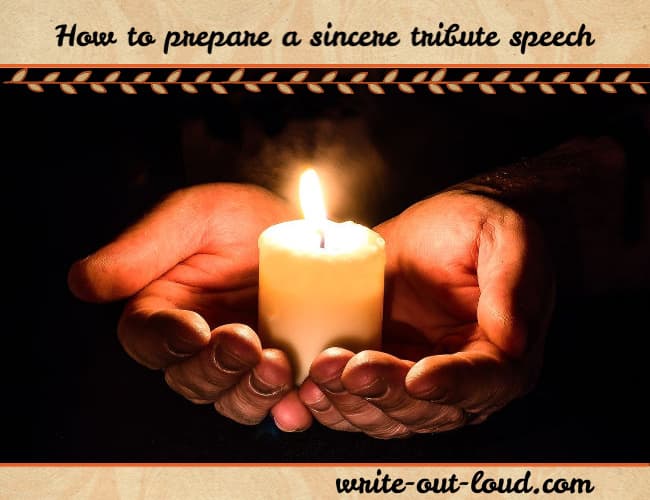
What occasions call for a tribute speech?
A tribute speech may be delivered at any of the following celebrations:
Anniversaries
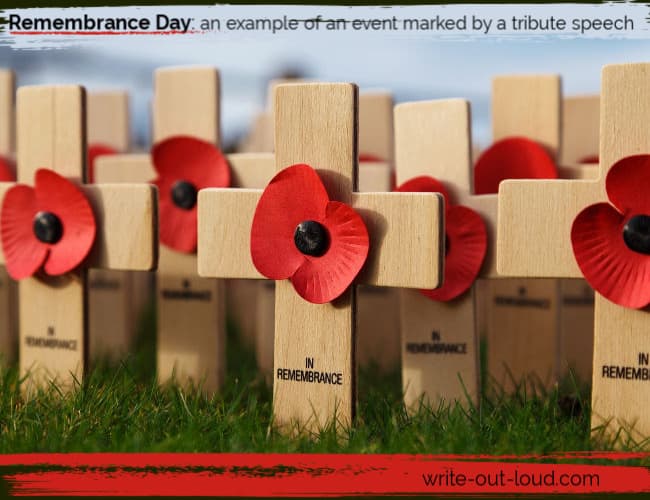
These may be family events for example; a 50th wedding anniversary or a milestone birthday , or they could be public ones, for example; celebrations marking historic events like Remembrance Day or, the passing of a famous person.
At a family reunion this form of speech may be given to honor its senior members.
Similarly it will be an important part of the reunions of people brought together by work, sport, interests or vocation.
Memorial services or funerals
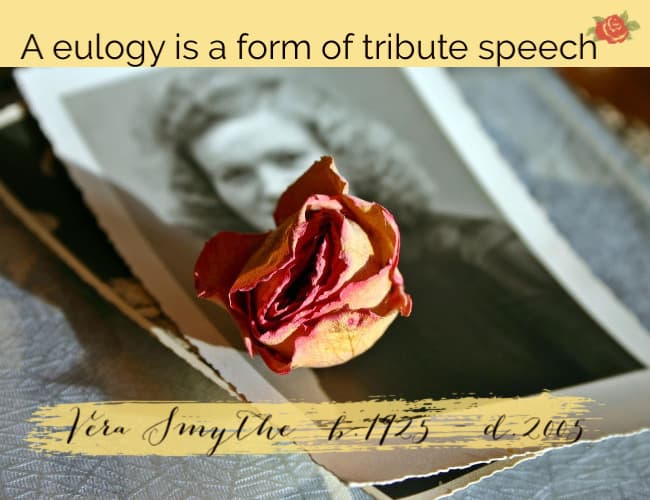
The eulogy you hear at a memorial service or funeral is a special type of tribute speech celebrating the life of the person who has passed away.
A tribute speech at an award presentation will honor the achievements of the award recipients. For example film, music or sports awards.
Although thought of as 'wedding speeches', the best man, father-of-the-bride speeches and their variations, are all forms of tribute speeches.
Retirements
The tribute speech heard at a retirement celebration honors the retiree by acknowledging their service and contribution.
The characteristics of the speech
Whether the focus is a person, or an event involving a group of people, its characteristics are:
- admiration and respect
- a focus on positive qualities: perseverance, dedication, humility, compassion, honesty, trustworthiness, loyalty, sacrifice, service, kindness, humor ...
- highlighting accomplishments and the difficulties overcome to achieve them
- a reflection on the positive impact and contribution of the focal group or person on the lives of others
- grateful acknowledgment of what we can learn from their example to take into the future
How to begin writing a tribute speech
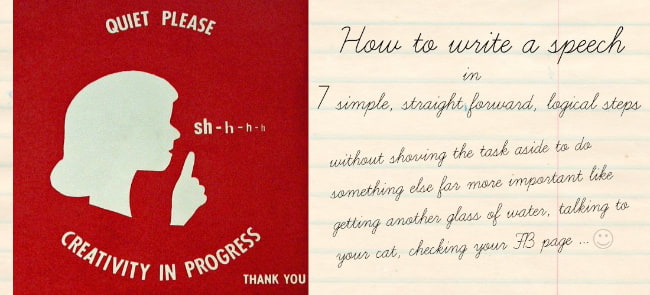
The first step in your process is finding out as much as you can about the occasion itself and then deciding on a topic, (if it hasn't already been decided for you).
You'll want to know:
- who the audience is
- whether you are the only speaker, or one in a series of speakers
- how long you expected to speak for
- whether the event is formal or informal
- if there are any special requirements the organizers may have that need to be included in your speech
How to choose a topic
Generally the occasion chooses it for you! If you're asked to speak at the celebration marking your Mother's 70th birthday or a similar event, then you know what the central topic is.
What you'll need to decide is how to handle it or what angle to take.

Get some help to find the right topic

If it's not clear what you should talk about, you'll find this page on how to select an inspiring tribute or commemorative speech topic helpful.
It walks you step by step through the process of finding a topic to suit your audience's needs and has a great selection of carefully picked links to help you research topic possibilities.
Get some help with planning and writing
There's a tribute speech template here that will be useful to help you plan the sections of your speech. Use it as a guide.
(On the same page is a speech I wrote to honor my Mother. It follows the template.)

Or if you'd like more than an outline to help you, you'll find the entire process of writing a speech mapped out step by step here: how to write a speech .
Are you here because you need to prepare a eulogy?

These links below will guide you through the process:
- How to write a eulogy Step by step guidance for preparing, writing and delivering a eulogy with a free printable eulogy planner.
- And if you'd like to include a special verse or quotation browse these pages of funeral poems and inspirational quotations .
Would you like to read a sample eulogy before you begin?
Reading others can be really useful in helping you decide what you want to achieve with your own speech.
Well known tribute speeches
Here are three famous speeches, each illustrating the characteristics of a fine commemorative speech.

- Ronald Reagan's tribute for the crew of the Challenger Space Shuttle that exploded during its launch.
- Sen. Edward Kennedy's eulogy for his slain brother: Robert F. Kennedy .
- Oprah Winfrey's eulogy for Rosa Parks .
Not-so well known tribute speeches
I am very fortunate to have a collection of not-so famous tribute speeches on write-out-loud.com.
These are very special because they're by people probably similar to yourself who have been asked to write a speech about someone they've loved dearly.
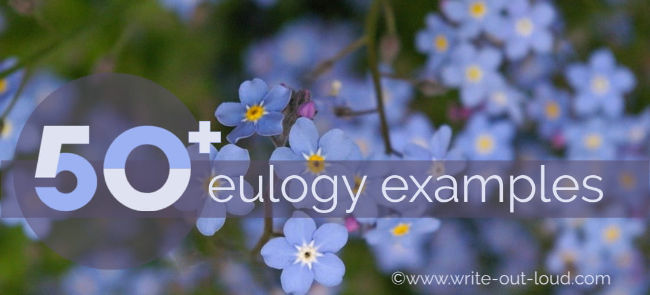
There are eulogies for mothers, fathers, sons, daughters, cousins, aunts, uncles, grandparents, colleagues, and friends.
All of them have been sent in to provide examples to help people who are trying to write. Seeing how others have handled the task gives them the courage and confidence to begin.
These eulogy pages get thousands of visitors every week.
And lastly, here is that link to the commemorative speech for my mother.
Do you need help with preparing to deliver your speech?
You'll find everything you need to help you give your speech confidently by visiting the site map .
There's tips on making and using cue cards , how to overcome fear or anxiety of public speaking , how use your voice well , and more.
If you're struggling for words you may like this offer ...

- Return to top of page
- Return to write-out-loud.com homepage
speaking out loud
Subscribe for FREE weekly alerts about what's new For more see speaking out loud

Top 10 popular pages
- Welcome speech
- Demonstration speech topics
- Impromptu speech topic cards
- Thank you quotes
- Impromptu public speaking topics
- Farewell speeches
- Phrases for welcome speeches
- Student council speeches
- Free sample eulogies
From fear to fun in 28 ways
A complete one stop resource to scuttle fear in the best of all possible ways - with laughter.

Useful pages
- Search this site
- About me & Contact
- Blogging Aloud
- Free e-course
- Privacy policy
©Copyright 2006-24 www.write-out-loud.com
Designed and built by Clickstream Designs
How to Write a Commemorative Speech

Are you in need of a high-quality, 100% plagiarism free essay or online class help? Place your order and get 100% original work.
What is a Commemorative Speech?
How do you write a commemorative speech.
- Understand the occasion
- Identify the audience
- Select a theme
- Create a commemorative speech outline
- Write the speech
- Rehearse and refine
1. Understand the Occasion
- Tailoring your message: You can’t wear a swimsuit to attend a snowball fight. The same scenario applies to your speech and the occasion. Understanding what the event is about helps you tailor your message to the mood, tone, and purpose.
- Connecting with your audience: People want to feel like you get them. When you understand the occasion, you can speak their language and touch their hearts. It’s like sharing an inside joke that creates a bond between you and your audience.
- Respecting the moment: Every occasion has its vibe and significance. Your speech should honor it, whether joy or sadness defines the moment. Understanding the occasion helps you strike the right chord and show respect for the event and the people involved.
Which Types of Events Call for a Commemorative Speech?
- Graduations: Whether from high school, college, or any other educational milestone, graduations are perfect for commemorative speeches. They’re all about celebrating achievements and looking toward the future.
- Retirement parties: It’s a big deal when someone bids farewell to their career! A commemorative speech can honor their contributions, share fond memories, and wish them well in their next chapter.
- Memorial services: Saying goodbye to a loved one is never easy. On the other hand, celebrating their life, sharing stories, and offering comfort to those grieving requires this type of speech.
- Anniversaries: It could be a wedding anniversary, company anniversary, or any other milestone. Commemoration talks boost the celebration of years of hard work, love, and dedication.
- Award ceremonies: When someone receives an award or recognition, it’s a moment to shine! A commemorative speech can highlight their accomplishments, inspire others, and celebrate their success.
- Dedications: There are buildings and parks, among other spaces, dedicated to someone or something special. The speech offered commemorates their legacy and the significance of the dedication.
Tips to Help You Gather the Right Occasion Information
- Ask around: Chat with people who know about the occasion or the honoree. Friends, family, colleagues—anyone sharing stories or insights can be beneficial.
- Search on the Internet: Let Google and Bing, among other search engines, be your friends. Look up news articles, social media posts, or other sources about the event or the person you’re honoring.
- Dig into archives: If it’s a historical event or a long-standing tradition, get into them. Check out old photos and history articles about the occasion for some background info.
- Read: Reading hard copies of anything about the occasion can give you valuable insights. It’s like cramming for a test, but you know the end goal.
- Interview people: Sometimes, the best info comes straight from the horse’s mouth. Schedule interviews with key players or people close to the honoree to get their perspectives and stories.
- Take notes: Whether you’re talking to someone or doing research online, jot down everything that catches your eye. You can pluck out what you don’t need later.
2. Identifying the Audience
Tips to help you identify the audience.
- Ask around: Yes, again, talk to people who know about those who will be attending. They can give you insights into what makes them tick. If you get to know some of the actual attendees, that will be much better.
- Do some snooping: Check out social media profiles or online forums where your audience hangs out. You’ll get a sense of their interests and what they’re discussing.
- Listen up: Pay attention to what people are saying. For example, if you’re writing a speech for a retirement party, listen to stories about the retiree’s career, hobbies, and achievements.
- Put yourself in their shoes: Imagine you’re in the audience’s shoes. What would you want to hear in a speech? What would make you laugh, cry, or feel inspired? Use that as your guide.
3. Select a Theme
- Resonating with the audience: When your theme aligns with the occasion, it relates deeply with your audience. It’s like speaking their dialect, making them feel connected.
- Adding meaning and depth: A theme reflecting the occasion’s essence adds value to your speech. It’s like painting in layers to create a vibrant picture of the moment.
- Honoring the purpose: Every occasion has its purpose and significance. A theme reflecting this marks the event’s purpose and shows respect for the people involved.
- Creating cohesion: A theme is a guiding light, keeping your speech focused and coordinated. It helps you stick to the topic and deliver a clear and impactful message.
Tips to Help You Choose the Right Theme
- Central message: The theme is the big idea or message you want people to get from your speech. It’s like the heart of your speech, beating with emotion and meaning.
- Focus on the occasion: Think about the occasion you’re commemorating. Is it a graduation, a retirement, or a memorial? Your theme should reflect the purpose and significance of the event.
- Honor the honoree: How do you commemorate someone in a speech? Consider their qualities and achievements, which should align with the occasion’s purpose. Your theme should celebrate and pay tribute to them. The same should apply if the honoree is an idea or a past event.
- Emotional connection: A good theme taps into your audience's emotions. Is the occasion full of joy, nostalgia, gratitude, or inspiration? Whatever it is, your speech should reflect that.
- Consistency: Once you’ve chosen a theme, stick with it throughout your speech. That’s the thread that ties everything you will write in your speech.
- What message do you want the listeners to get from you?
- How it relates to the occasion and honoree
Examples of Themes for Various Occasions
- Anniversaries
- Perseverance
- Independence
4. Create a Commemorative Speech Outline
- Grabs the audience’s attention with a compelling opening.
- Introduces the occasion and the purpose of the speech.
- Provides an insight into what is in your speech.
- It’s divided into several main points or sections.
- Each main point focuses on a specific aspect of the occasion or the honoree.
- The point is supported with anecdotes, stories, and other relevant details.
- It should have a logical flow as it transitions smoothly between points.
- It summarizes the key points in your speech.
- Reinforces the conveyed message.
- It leaves the audience with a memorable closing statement or call to action.
How to Write a Compelling Introduction for Your Commemorative Speech
- Start with a bang: Grab your audience’s attention immediately! You can have a powerful quote, a thought-provoking question, or an intriguing anecdote related to the occasion or the honoree.
- Create the atmosphere: Describe the event or the individual you're celebrating in rich detail. Include the occasion’s significance or the impact of the honoree’s achievements. That creates a sense of context and importance.
- Express gratitude: Show the audience that you appreciate the chance to speak to them. A heartfelt thank you can go a long way in establishing a connection with your audience right from the start.
- Preview what’s to come: Give your audience a sneak peek into what they can expect from your speech. Briefly outline the main points or themes you’ll cover to pique their curiosity and set expectations.
- Inject some personality: Let your personality shine through! It could be a touch of humor, a hint of nostalgia, or a dose of sincerity. Whatever it is, infuse it in your introduction with a unique style and voice to make it engaging.
How to Organize the Body of Your Commemorative Speech
- Stick to the topic: Think of each main point in your speech as a mini-story. Each should focus on a specific aspect of the occasion or the honoree. Whether highlighting achievements, sharing memories, or celebrating qualities, keep it focused on one main idea per point.
- Use a logical order: View your speech as a story. Ensure that your points are organized to flow naturally. For example, you could start with the past, move to the present, and end with the future.
- Transition smoothly: Transition phrases or sentences connect your main points seamlessly. They send signals to your audience that you’re shifting gears. If you are demonstrating something, this tip will be helpful. If you have a demo to show on your occasion, check out 100+ demonstration speech ideas for college students .
- Provide supporting details: Each main point needs some meat on its bones! Use anecdotes, stories, quotes, or other relevant information to help illustrate your main ideas.
- Reinforce your theme: Remember that you selected a theme as discussed in the third step. Keep coming back to it throughout your speech. Every main point should tie back to your theme in some way. That will help reinforce the message you want to leave with your audience.
- End with an impact: Your last main point should be the climax of your speech. It should leave your audience with a powerful impression. Make it count, whether it’s a heartfelt call to action, a poignant reflection, or an inspiring message.
- How Do You End a Commemorative Speech?
- Revisit your theme: Remind your audience of your speech’s central theme or message. Summarize the key points you’ve covered and tie them back to your theme. This helps reinforce your message and ensures it sticks in the listeners’ minds.
- End on a high note: Your conclusion should leave your audience feeling inspired, uplifted, or moved. Consider ending with a powerful quote, a heartfelt reflection, or an uplifting message that helps digest the essence of your speech.
- Call to action: If appropriate, have a call to action that inspires your audience. It could be pursuing their dreams, cherishing their loved ones, or positively impacting the world. Just ensure that you give them something to think about or act upon.
- Leave them wanting more: A great conclusion leaves your audience satisfied yet hungry for more. Consider ending with a thought-provoking question, a memorable anecdote, or a teaser for what’s to come.
- Express gratitude: Finally, take a moment to thank your audience for their time, attention, and support. Express your appreciation for the opportunity to speak and the celebrated occasion. A sincere thank you goes a long way in leaving a positive impression.
5. Write the Speech
- Know your audience: Remember who you’re speaking to based on the audience research you did in the second step. Use language and stories that they can relate to and connect with emotionally.
- Tell stories: People love stories, so sprinkle them throughout your speech! Share anecdotes, memories, or experiences that highlight the honoree’s impact or the occasion’s significance.
- Be genuine: Speak from the heart! Your audience will know when you are sincere. It’s also a good idea to let your emotions and personality show. Authenticity goes a long way in connecting with your audience.
- Use vivid language: Use your words to paint the scene. Use descriptive language and sensory details to evoke emotions and create a lasting impression. Show, don’t tell—let your audience see, hear, and feel what you’re describing.
- Inject some humor: A well-placed joke or lighthearted moment can lighten the mood and make your speech more memorable. Just be sure to keep it appropriate for the occasion and the audience.
- Include quotes: Sprinkle wisdom from famous quotes or sayings related to your theme. Quotes can add depth, authority, and inspiration to your speech. They also help reinforce your message and captivate your audience.
- Keep it concise: Less is often more! Be mindful of your speech’s length and stick to the essentials. Trim any unnecessary details or tangents to keep your audience engaged and focused.
- Practice: Finally, practice makes perfect! Rehearse your speech until you feel comfortable and confident delivering it. Focus on your pace, tone, and gestures to ensure your delivery matches the heartfelt content of your speech.
- Metaphor: “Our friendship is a beacon of light, guiding us through life’s darkest storms.”
- Simile: “His courage shone like a beacon in the darkest of times, guiding us through adversity with unwavering strength.”
- Alliteration: “We celebrate our beloved friend’s strength, spirit, and selflessness.”
- Repetition: “Today, we honor. Today, we remember. Today, we celebrate.”
- Parallelism: “His legacy will be remembered for his kindness, generosity, and unwavering dedication to serving others.”
- Anaphora: “She was a teacher. She was a mentor. She was a friend.”
- Imagery: “His laughter echoed through the halls, a symphony of joy that will always be treasured in our hearts.”
- Emotional appeal: “Let us keep the shared memories, hold dear the moments we’ve treasured, and carry forward the legacy of love she leaves behind.”
- Quotations: “In the end, not the years in your life count. It's the life in your years.” - Abraham Lincoln
- Rhetorical questions: “How do we measure life’s impact? Not in years, but in the lives touched, the hearts uplifted, and the memories cherished.”
6. Rehearse and Refine
- Building confidence: Rehearsing your speech more gives you the confidence to deliver better.
- Smoothening out the rough spots: Rehearsing helps you identify any stumbling blocks or tricky parts in your speech. By practicing those parts over and over, you can ensure a seamless delivery.
- Refining your delivery: Rehearsing allows you to fine-tune your tone, pace, and gestures. You can experiment with different speech delivery methods to see what works best.
- Fostering familiarity: The more you rehearse, the more familiar your speech becomes. This familiarity makes it easier to recall your points, stay focused, and know how to connect with your audience. Compare it to knowing the lyrics of your favorite song—you can sing along without missing a beat!
Rehearsing and Refining Tips to Ensure Effective Communication as explained in our other article mass communication media assignment help .
- Try using different tones to see which one matches the mood depicted by your speech. For heartfelt moments, use a warm and sincere tone. For moments of reflection, use a calm and contemplative tone.
- Practice varying your tone throughout your speech to keep your audience engaged. Use excitement for moments of celebration, empathy for moments of empathy, and conviction for moments of inspiration.
- Practice speaking at a comfortable and natural pace. Avoid rushing your speech, as it can make you nervous or flustered. Conversely, avoid speaking too slowly, as it can bore your audience.
- Pay attention to your breathing and take pauses at strategic moments. It helps in emphasizing key points or allowing your audience to digest information. Pauses can also create anticipation and build suspense.
- Use gestures to enhance your words and convey emotion. For example, use open palms to express openness and sincerity. You can also use hand movements to illustrate a point or emphasize a word.
- Practice using a variety of gestures, but be mindful of overdoing it. Your gestures should complement your speech rather than distract from it.
- Pay attention to your body language and posture. Stand tall without shaking, look at the audience directly, and let your body show authority and confidence.
- Use a mirror to practice or record yourself to observe your tone, pace, and gestures. Note the areas that you should improve and make adjustments accordingly.
- Seek feedback from those close to you. Ask them to focus on your tone, pace, and gestures and provide constructive criticism. Use their feedback to refine your delivery further.
Who Should I Do a Commemorative Speech On?
Get professional commemorative speech writing.
- Offer speech consultation: You can get personalized consultations to discuss the speech needs, the occasion, and the honoree or subject of the speech.
- Write the speech: Our professional speech writing services will craft a custom commemorative speech tailored to your specifications.
- Edit and revise the speech: After writing, we will edit, modify, and tune that speech to your liking. This would involve refining language, improving clarity and flow, and ensuring the speech effectively communicates the intended message.
- Provide feedback and critique: We can also tell you what your speech sounds like. We offer suggestions for improvement and highlight areas of strength.
Frequently Asked Questions
1. what makes a commemorative speech good.
- Recognition of the occasion and the honoree
- Inspiration to the listeners
- A focus on values
- Sharable memories, anecdotes, and other rhetorical devices
2. Which of the following is an example of commemorative speech?
- A wedding toast to a friend who just married
- An Independence Day speech from the president
- A eulogy for a deceased family member
- A farewell speech of a workmate who is transferring
- Award acceptance speech after winning a football trophy
3. How long should a commemorative speech be?
4. where can i find examples or templates of commemorative speeches, do you need any homework, essay writing or online class help.

Meet the author
Melanie is a seasoned writer with more than 8 years of experience. She is passionate about academia and works off the clock to ensure she write the topnotch content for her readers.
Get Homework Help Now
Related posts.
- »How to Cram for The Final Exam
- »How To Write A Claim In An Essay
- »How to Write a Character Reference Letter
- »How To Write An Outstanding Essay Outline
- »How to Write Footnotes and Endnotes
- »11 Homework Writing Tips
- »Convincing Excuses For Late Assignment
- »How To Prepare For Thesis Defense
- »How to Cheat On a Proctored Exam
- »How To Cheat Honorlock
- »How to Get Good Grades in College Essay
- »100 Impromptu Speech Topics
- »How to Cite a Poem
- »How to Study College Math Courses
- »What Happens the First Day at College
- »How to Manage College Stress for Students
- »How to Be a Successful Online Learner
- »How to Save Money in College
- »100 Controversial Topics For Teenagers
- »10 Tips For Better Online Learning Experience
- »100 Persuasive Essay Topics For College Students
- »50 Captivating College Essay Prompts
- »100 Capstone Project Ideas
- »Guide on How to Write a PESTLE Analysis
- »How to Write an Essay Outline
- »How to Write Attention Grabbing Essay Hook
- »100 Best Conclusion Paragraph Starters
- »How to Pass and Prepare GED Tests
Why Choose Us
- 100% Original Work
- 24/7 Customer Support
- Unlimited Free Revisions
- Experienced Writers
- Real-time Communication
- Affordable Prices
- Deadline Guaranteed

Commemorative Speech
Commemorative speech generator.

What is the first thing that pops into your mind when you think of a commemorative speech? Four words: graduation and recognition day. Well, you are not wrong about that. Merriam-Webster defines commemorate as either to celebrate (an event, a person, or a situation) by doing or building something or to recall and show respect for (someone or something). But have you ever wondered why this type of speech is normally given on those days? Not just because that particular day marks the students’ achievement or moving forward in their academic studies, but commemorative speeches act as a way to inspire the students in keeping up the good work they by inputting values. You may also see thank-you speech .
- Speech Templates
- Speech Examples
What is a Commemorative Speech?
According to an article in the University of Pittsburgh database, commemorative speeches are sometimes known as “ceremonial” or “epideictic” speeches. They are often used to pay tribute or praise a person, an institution, an event, idea, or place with their emphasis on values. It can be said that all societies hold certain values central to human existence: beauty, loyalty, wisdom, kindness, tradition, success, innocence, experience, courage, perseverance, kindness, for instance. Commemorative speeches celebrate these values. Some types of commemorative speeches include the eulogy, the speech of nomination, the speech of goodwill, the wedding toast, and the award acceptance speech. You may also see presentation speech .
Commemorative speeches are not simply informative, they act as a way for people to remember why they celebrate that in the first place. For example, a speaker would not just give a biography of who George Washington was, but rather would celebrate who he was, why he was worthy of praise, and encourage the audience to celebrate those values. You may also see orientation speech .
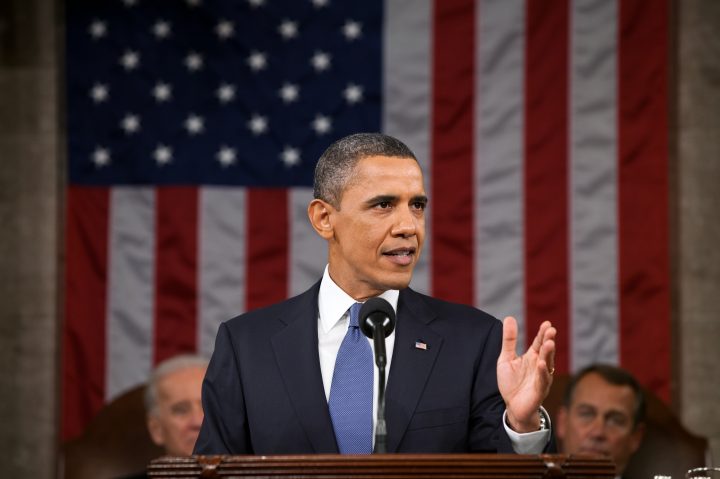
Commemorative Speaking and the Future
Often, inspiring commemorative speeches goes beyond celebrating past or present accomplishments to give the audience hope for the future. Take the case of famous personalities like Nelson Mandela or Dr. Martin Luther King. These two men may come from different parts of the world, but they stood up for something that inspired the people to stand up for what is right and combat the injustices that they face despite all odds (Mandela against racism in Africa and Dr. Martin Luther King for equal rights for all African-Americans); some people would refer to these personalities in their speeches. Try to consider how the speaker can link past, present, and future in a commemorative speech. You may also see introduction speech
Commemorative Speech Example
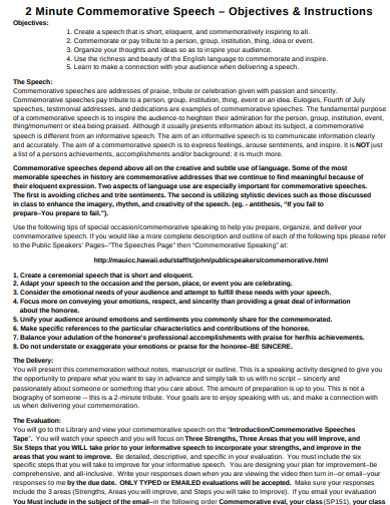
Size: 13 KB
Sample Commemorative Speech
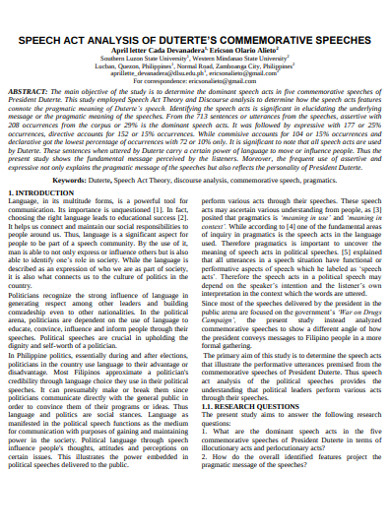
Size: 444 KB
Commemorative Speech in PDF
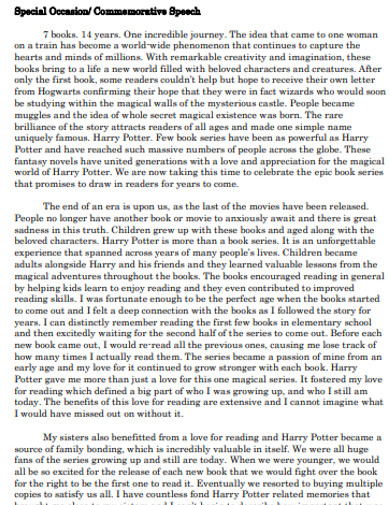
Size: 117 KB
Language becomes an essential part of effective commemorative speeches especially when using stories, illustrations, and figurative language to help the audience to relate your experience.Note that it is difficult to pay tribute to trivial topics. Therefore, a commemorative speech on, say, “tailgating parties” would not be appropriate. You may also see farewell speech
This speech is about what is most important to society –honor, trust, gentleness, etc.

Brainstorming Topic Ideas
Before writing a commemorative speech, brainstorm some ideas for information that you could include in your speech according to YourDictionary , an affiliate of LoveToKnow Media .
- What memories, ideas, or information about this person would you want to share with a greater audience?
- How can you respectfully share the significance of this person with others?
- What stories would you want to hear when listening to this commemorative speech?
The end goal of your commemorative speech should not only be to make the audience remember your words of wisdom, but to fully express yourself in order to motivate others to feel strongly as well. Oftentimes, these speeches are filled with emotion, and other times, they are filled with inspiration, hope, and information.You may also see motivational speech
Commemorative Speechwriting
As you write your speech, make sure you have friends or colleagues who are willing to listen to your draft before finalizing your speech. The spoken word – especially when words are caught between tears of sadness – can be difficult to understand, so something on paper that makes sense might not be easy to understand aloud. You are going to need to rely on others for advice about changing phrasing, word order, and even speech patterns so that what you write becomes comprehensible. Keep this in mind as you formulate your speech on paper. You may also see declamation speech
Think about the person, place, or other thing that is being praised through your speech.
- Can you balance tradition and formality with personal touches within your speech?
- Make sure that your words are respectful: Lots of people will hear this speech, and some might judge you based upon the stories you share and the speech elements you include.
- Write from the heart. It is obvious when you are speaking about something you care very little about.
If you are not inspired, talk to others who have been motivated and inspired by the thing you are commemorating, and see if you can draw ideas and inspiration from their passion.
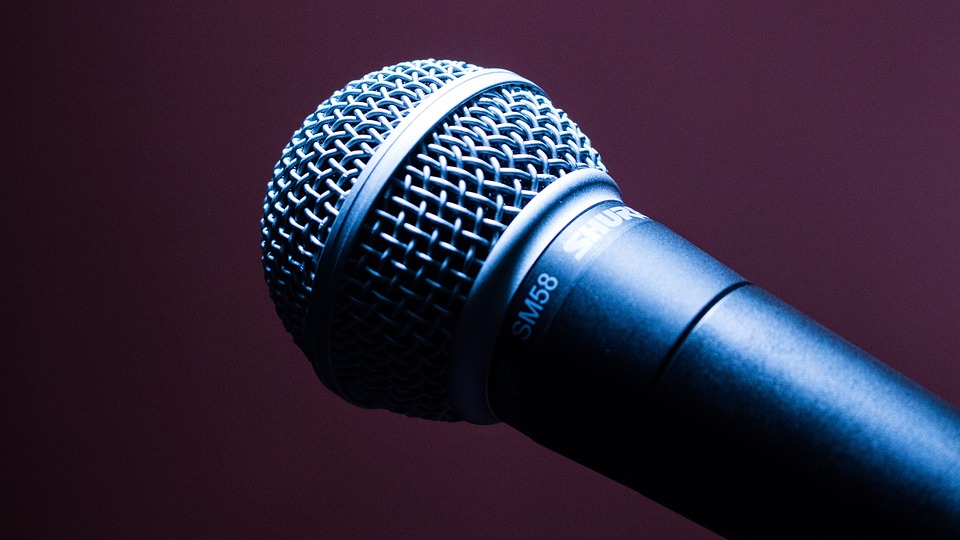
Tips and Tricks for Writing Your Best Speech
Keep in mind that depending on the type of speech you will be delivering and to whom you will be speaking to, it is important that you adjust the content of the message and perhaps some of the terminologies present in your speech, so that the audience can understand your speech better. You may also see leadership speech .
- Clarity and conciseness are key in delivering an awesome speech. Try to take the time to explain things instead of using jargon that might leave the audience confused.
- Avoid talking down to an audience of professionals. Make it a point that your tone is reserved and respectful instead of boastful of your own knowledge.
Remember that this speech is not about you, nor is it in reality about the person being commemorated. The key is to speak for the audience. You are really there to help people deal with their feelings, let them express themselves, and to represent the collective voice. You may also see welcome speech .
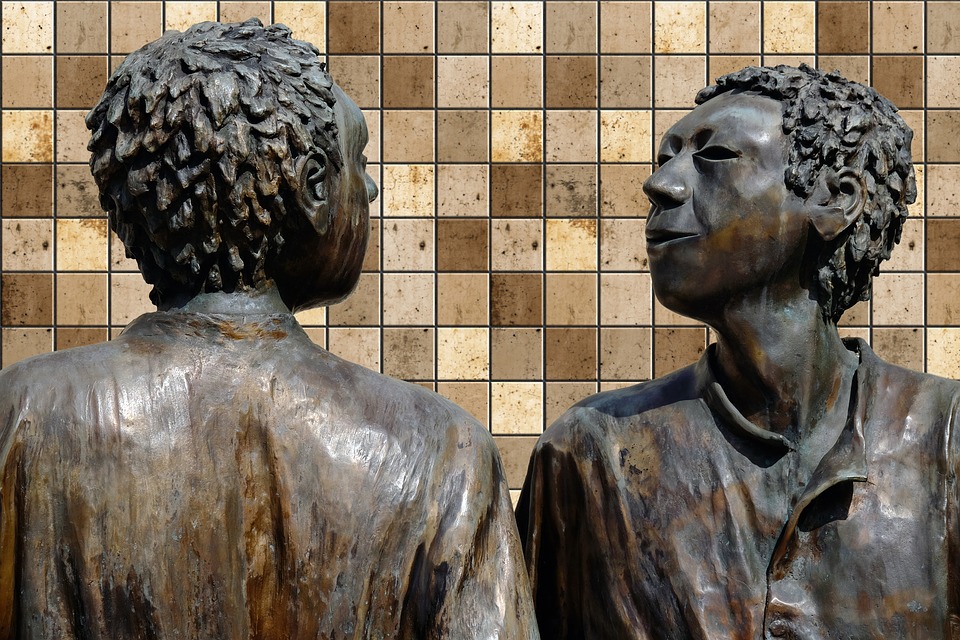
Do not use this speech as a chance for self-promotion or to share your hubris. If you are worried about how people will perceive you, remember that if you can give a selfless speech, this will speak more than threading personal pats-on-the-back throughout your speech.When writing a commemorative speech, keep it simple, respectful, and honorable. It is common courtesy, after all. You may also see informative speech
Basic Commemorative Speech

Size: 73 KB
Commemorative Meeting Speech
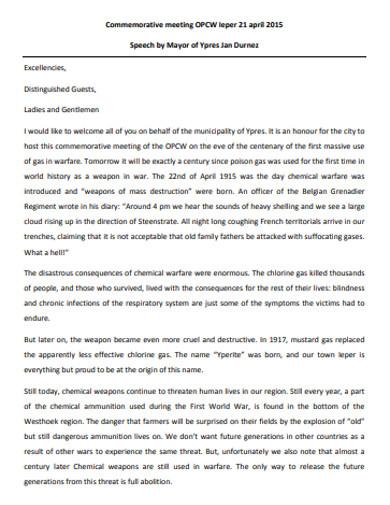
Size: 188 KB
Text prompt
- Instructive
- Professional
Write a Commemorative Speech honoring a historical figure.
Create a Commemorative Speech for an anniversary of a significant event.
📕 Studying HQ
How to write a commemorative speech with examples, carla johnson.
- October 9, 2023
- How to Guides
Nursing is a profession that embodies compassion, dedication, and unwavering commitment to the well-being of others. As nursing students, you are on a journey to join the ranks of these incredible healthcare heroes. A commemorative speech is a powerful way to honor the achievements, dedication, and contributions of nursing professionals . In this article, we will explore what a commemorative speech is, dissect an exemplary speech, and offer insights on how to write a commemorative speech to nurses who inspire and motivate you.
What You'll Learn
What is a Commemorative Speech?
A commemorative speech, often called a tribute speech, is a type of public address delivered to honor and celebrate a person, group, event, or idea. In the context of nursing students, it serves as an opportunity to pay tribute to the extraordinary nurses who have made significant contributions to the field. These speeches are not only a means of expressing appreciation but also a way to inspire and motivate future nurses by highlighting the virtues and qualities that define excellence in nursing.
Example of a Commemorative Speech
Title: “a tribute to nursing excellence: celebrating the pioneers”.
Ladies and gentlemen, esteemed faculty, fellow nursing students , and distinguished guests, today we gather to pay tribute to the unsung heroes who have left an indelible mark on the world of nursing. These individuals have dedicated their lives to the service of humanity, exemplifying the very essence of what it means to be a nurse.
I. The Heart of Nursing
A. Compassion and Empathy
At the heart of nursing lies compassion and empathy. Our honorees today have not only demonstrated these qualities in their daily practice but have elevated them to an art form. Through countless hours spent by the bedside, holding hands, offering a comforting word, or simply lending a listening ear, they have shown that healing begins with empathy.
B. Dedication and Sacrifice
Nursing is not merely a profession; it is a calling. Our nursing pioneers have made sacrifices that go beyond measure. They have missed family gatherings, worked long shifts , and endured physical and emotional exhaustion, all in the name of caring for others. Their unwavering dedication serves as a beacon for us all.
II. Innovation and Advancement
A. Embracing Change
In the ever-evolving landscape of healthcare, innovation is key. The nurses we honor today have not shied away from change; instead, they have embraced it. They have been at the forefront of adopting new technologies and best practices , ensuring that patient care remains at the cutting edge.
B. Lifelong Learning
Nursing is a journey of continuous learning. Our celebrated nurses have shown us that education doesn’t end with a degree. They have pursued advanced degrees, attended conferences, and conducted research, contributing significantly to the advancement of nursing knowledge.
III. Leadership and Advocacy
A. Leading by Example
True leaders lead by example. Our nursing pioneers have not only excelled in their clinical roles but have also taken on leadership positions. They have mentored new generations of nurses, inspiring them to reach their full potential.
B. Advocating for Change
Advocacy is a fundamental aspect of nursing. Our honorees have used their voices to advocate for better patient care, improved working conditions, and healthcare policy changes. Their advocacy has made a difference, leaving a lasting impact on the nursing profession.
In conclusion, as nursing students, we stand on the shoulders of giants. The nurses we celebrate today have set a high standard of excellence in our field. They have shown us that nursing is not just a job but a lifelong commitment to compassion, innovation, leadership, and advocacy.
As we embark on our own journeys in nursing, let us remember the invaluable lessons we have learned from these remarkable individuals. Let their dedication and passion inspire us to become the best nurses we can be. Let us carry their legacy forward, ensuring that the torch of nursing excellence continues to burn brightly.
If you find yourself tasked with delivering a commemorative speech in the future or need assistance with any form of academic or professional writing, remember that help is just a click away. Our professional writing services are here to support you in crafting impactful speeches, essays, and content that resonates with your audience. Contact us today to discover how we can assist you in making your words truly shine.
Q1: What is a commemorative speech example? A commemorative speech example is a speech given to honor and celebrate a person, group, event, or idea. It typically highlights the virtues and qualities associated with the subject of tribute.
Q2: How do you start a commemorative speech example? Begin a commemorative speech by addressing the audience, acknowledging the significance of the occasion, and introducing the purpose of the speech, which is to celebrate and honor the subject of tribute.
Q3: What do you say in a commemorative speech? In a commemorative speech, you should talk about the subject’s qualities, achievements, contributions, and the impact they’ve had on others. Share personal anecdotes, memorable stories, or quotes that capture their essence.
Q4: What is an example of a commemorative speech conclusion? A commemorative speech conclusion should summarize the key points, express gratitude, and leave a lasting impression. For instance, you can conclude by emphasizing the subject’s legacy and how their influence will continue to inspire future generations
Start by filling this short order form order.studyinghq.com
And then follow the progressive flow.
Having an issue, chat with us here
Cathy, CS.
New Concept ? Let a subject expert write your paper for You
Have a subject expert write for you now, have a subject expert finish your paper for you, edit my paper for me, have an expert write your dissertation's chapter, popular topics.
Business Analysis Examples Essay Topics and Ideas How to Guides Nursing
- Nursing Solutions
- Study Guides
- Free College Essay Examples
- Privacy Policy
- Writing Service
- Discounts / Offers
Study Hub:
- Studying Blog
- Topic Ideas
- Business Studying
- Nursing Studying
- Literature and English Studying
Writing Tools
- Citation Generator
- Topic Generator
- Paraphrasing Tool
- Conclusion Maker
- Research Title Generator
- Thesis Statement Generator
- Summarizing Tool
- Terms and Conditions
- Confidentiality Policy
- Cookies Policy
- Refund and Revision Policy
Our samples and other types of content are meant for research and reference purposes only. We are strongly against plagiarism and academic dishonesty.
Contact Us:
📞 +15512677917
2012-2024 © studyinghq.com. All rights reserved

Commemorative Speech: Guide, Tips, and Topic Ideas
Are you planning to give a commemorative speech and don't know where to begin? You are in luck. A commemorative speech, also known as a ceremonial speech, aims at paying tribute to someone's contributions. Knowing how to write a commemorative speech will help determine whether your message will positively impact the audience.
You must first understand what a commemorative speech is, the topics involved, and how to write an outline to begin writing. The following guide will help you know what to do when writing a commemorative speech.
What is a Commemorative Speech?
A commemorative speech is a form of a public presentation to honor or celebrate a person, group, institution, or idea for their accomplishments or contributions to the world. In simpler terms, the speech aims at uniting people to celebrate, appreciate and remember someone for their good
The main objectives of the speech are to:
- Honour and celebrate
- Uplift and inspire others
- Motivate people to do good
- Provoke sentiments
Ideally, once your audience has heard everything you say, they will be hopeful and positively influenced. The speech could be given to smaller or bigger audiences; for instance, commemorative speeches celebrating memorial or Independence Day are often for larger groups of people.
You have to go for a commemorative speech topic that truly resonates with the demands of the event. When giving the speech, you have to focus on the aspect of the topic's past, present, and future to deliver an inspirational message such as, success, loyalty, wisdom, courage, hope, etc. Therefore, you must really think through, write from the heart, and highlight all the important events from the past.
Our academic speech essay writers can come through for you if all you want is your speech assignment written by the best.
Commemorative Speech Outline
A commemorative speech should follow the outline below:
- First, begin by stating the aim of the topic you have chosen. Then, start by stating something interesting about that person or thing you are celebrating.
- Why are you paying the tribute? It is important to state your reason for paying tribute to the subject.
- Highlight the contributions of the subject
- State the importance of those achievements
- Make the audience think about how they can also be kike that subject
- Summarize what you have talked about
Features of a Good Commemorative Speech
You should be able to capture the attention of the audience and want them to listen to it from start to finish. This is why your speech should be:
Engaging- Even if you have a room full of eager speakers, what matters most is how you engage with them. High engagement helps you stand out and create room for making your message more meaningful. You should be creative and avoid clichés if you want to stand out. Great speakers engage the audience using all five senses: sight, hearing, speech and touch.
Inspiring- Inspiration is the main purpose of a commemorative speech. Unfortunately, most speakers focus on themselves and forget that it is about the audience. You should sound bold and authoritative at the same time, humble to inspire your audience. Make sure you maintain eye contact with every person in the room and speak with them deliberately. That way, you can guarantee that your message provides value to your audience to be inspirational.
Relevant- Always ensure that you stay relevant to current events instead of just being general. You can achieve this by first being aware of your audience members, especially if you intend to reference them in the speech. For instance, if there are software engineers, ensure you reference them in your speech. Also, ensure you anticipate the questions they will ask and be prepared to answer them.
Positive-Since, the main purpose of a commemorative speech, is to celebrate someone, you should be positive from start to finish. However, obviously, if you seem overly enthusiastic, the speech will sound unnatural. You should therefore comprise a little bit to deliver a positive speech and meet the overall goal. In other words, when choosing a topic, you should select one that is optimistic and inspiring.
How to Choose a Commemorative Speech Topic?
Follow these methods when looking for a good commemorative topic:
Know What a Commemorative Speech is all about
You should understand all the characteristics of a commemorative speech to select the right topic. From the word go, to commemorate means to celebrate or praise. Therefore, your speech should unite and inspire by outlining the great memories of the subject.
Know the Purpose of the Occasion
Do a little research to determine what the occasion is about to understand how to give the right speech. You can reach out to the person in charge of the event to get more information or ask them what they would like the speech to be about. The speech could be prepared for reunions, funerals, dedications, or anniversaries. Whatever the case, just make sure you are in line with the event's purpose. The last thing you want to do is, choose a topic that is the opposite of what the event is about.
Know Who Your Audience Are
Understand whom your audience is first if you want to deliver the speech seamlessly. You can achieve this by doing a little research first before the event. These questions can help you get started:
- Why are they in the event?
- What is the main thing that unites them? It could be gender, age, race, health, nationality, or sport among others
- What do they expect from the event?
- What are their experiences?
- What are they hoping for?
- What are their worries?
Answering the above questions will help you determine the context of the speech.
Highlight the Qualities
Since a commemorative speech is about honoring someone or something, you should have all the notable qualities at your fingertips. If you do not remember some, it would not hurt to write them down. You should list all the qualities being celebrated. Let the purpose of the event and your audience guide you.
Steps for Writing a Commemorative Speech
Choose the Right Theme
Since a commemorative speech is aimed at honoring a person for their accomplishment, choose a theme in line with this goal. Think of the impact that person has brought to the people and you as well. While doing this, ensure that the themes are unique and not identical to what other speakers have discussed. They should also be meaningful enough that it provides a valuable message to the audience. Some of the themes of a commemorative speech include bravery, loyalty, service, independence, leadership, generosity, and creativity, among others.
After choosing a theme, select a material that will illustrate your chosen theme. To help you get started, let these questions guide you:
- Will your speech retell past stories about people or events that your audience is already aware of?
- Will you do some research to find events or stories that will reinforce your speech?
- Or will you just use your personal experience?
A good commemorative speech draws from the above points and combines them seamlessly to make sense to the audience.
Brainstorming Content Ideas
After selecting the right theme, it's time to brainstorm content ideas to include in your speech that will truly inspire your audience. Brainstorming ideas will help you develop ideas that celebrate the person and inspire the audience. Consider the following questions to help you come up with the right ideas:
- In what way can you truly share the significance of the person, group or things with other people?
- What would you like to hear if you were part of the audience?
- What are some of the important memories or ideas you can share?
- Who was this person, group, institution, or thing, and how are they important to the audience?
Write an Outline
Similar to other pieces of writing, a commemorative speech must follow the right structure and organization to eloquently pass the message as intended. Thus, write an outline that shows your main points. Before doing this, the first review is to ensure that you are not just passing along a bunch of information but also rather celebrating the subject.
Write a Great Introduction
To truly capture your audience's attention and ensure your audience are aware of your subject's amazing contribution, you have to start with a great introduction. You can achieve this by beginning with a broad claim about the type of impact the subject has had. A good introduction should capture the attention of the audience, state the topic, make it relatable, establish credibility and highlight the main points. Make sure you build a personal connection right from the beginning and do your best to maintain it throughout the speech.
Develop the body of the speech
The body is the center part of the speech, which discusses all the main points. It is everything else apart from the introduction and conclusion. The speech will need between two to five points that truly discuss the subject's achievement.
Share Key Details
Add key subject details to the speech to make an impact. This information should be factual to ensure you do prior research to avoid looking uninformed in front of your audience. In addition, you can add any available sayings attributed to the subject of your speech.
Conclude Naturally
A good commemorative speech is like a good movie; you start by grabbing the audience's attention, develop the main points, and then end strongly.
Do not forget about ending the speech the right way if you want your message to be persuasive enough. Writing a conclusion for your speech is just as important as writing the introduction. The words you say at the end are usually the most persuasive, and your audience will remember them for a long time. The most memorable commemorative speeches ended with a bang and stirred up words that have lived on in memory.
Consider the following tips to help you end your speech the right way:
- Plan for the ending remarks word for word by knowing the purpose of the talk. This includes what you want your audience to take from the speech. When you are aware of what you want your result to be, it will be easier to come up with an impactful conclusion.
- Have a call to action. It is important to tell your audience what they should do with the message you have given through the speech.
Practice in Front of an Audience
After writing your speech, read it in front of your close friends and family, who can critique and help add clarity to it. Even expert speeches require reviewing before being delivered to the audience. Your speech may look good on paper but fail to deliver the right message when read aloud or be full of errors. So ask for an honest opinion from those close to you concerning the facts, phrasing, and, flow of the speech.
How to Start a Commemorative speech?
Ever heard of “You never get a second chance to make a good first impression?” Well, the same can be said for starting a commemorative speech. How you start, your speech will determine whether people will listen to it or have, their minds wander off into the unknown. In addition, this will prevent your message from getting across. Capturing the attention of any audience is challenging but not impossible. These tips can help you do it the right way.
Use a Fascinating Story
A fascinating story is a perfect way to capture the imagination of your audience in your commemorative speech. A story makes your speech more than just words stacked together. It is a way of connecting with your audience by bringing the content of your speech to life. Your audience should be able to connect and relate to your story if you intend to make it more memorable.
There are different ways to tell a story to make it more captivating. These ways are:
Hero’s Journey
In a hero's journey, also known as monomythic, a hero goes on an adventure, then experiences and then faces a crisis in different stages, and eventually comes out as a conqueror and returns home in victory.
Rags to Riches
A rags-to-riches story shows how the main character faces hardships throughout their life but later achieves victory and great success.
False Start
When telling a false start, you begin by telling a predictable story and then revealing something out of nowhere before starting another story with a new perspective.
Use a Quote
Starting a speech with a relevant quote can help set the tone. A quote can help reinforce your main ideas by providing a second voice to echo your claims without repeating what you have said. It also shows your audience that you are credible by showing that other famous people agree with your sentiments. It doesn't have to be a quote from famous people like Abraham Lincoln, Albert Einstein, or Mahatma Gandhi; you could quote someone your audience knows, like an earlier speaker.
Even though starting with a quote can positively influence your speech, do not assume that any quote can grab your audience's attention. Make sure you research first to get the phrasing correct; you do not want your audience to think you do not know what you are talking about. Apart from research, ensure you find a reliable source and avoid controversial quotes that could mislead the audience.
Ask a Question
The audience will always answer a question intuitively, whether the answer is called for or not. Therefore, questions are an effective way for you to control your message and the thought of the audience. They are among the best ways to engage your audience and persuade them to agree with your sentiments.
Be strategic in how you pose the question: A short and direct question is a way to draw your audience in. However, avoid manipulative or patronizing questions, as they could easily annoy our audience.
There are several questions starter you can pose to your audience. They could be based on experience, emotion, decision-making, or imagination. Before asking, ensure you determine the energy of your audience.
Use a Statistic
Startling statistics will clinch your claims and open the door to delivering your message. Fact and numbers add reality and bring reality into your claims. It also helps amplify you are your message by giving it an emotional feature.
Ensure that the statistic has the background context for your audience to assess it properly. A naked statistic will not do your speech much good, and it will make your audience wonder what your intentions are. So take your time researching and only choose one from a credible source.
Starting with humor will put your audience at ease and keep them wanting more. In addition, a good joke will make you more memorable since the joke will be easier to remember than a complicated point. There are several types of humor to use, which can crack your audience up, such as:
- Turn of Phrase- In a turn of phrase humor, you start off by making a serious argument in one direction before revealing its true meaning unexpectedly.
- Use the Pun- A pun uses words that humorously suggest more than one meaning.
- Irony- this is using words in such that they have a different meaning which is different from what their actual meaning is
- Sarcasm- this is using worse that means the opposite of what you what to convey
Keep the following in mind when starting a commemorative speech with humor:
- Don’t tell a rude or unkind joke
- Don’t make a joke about your audience
- Observe your audience first to know whether it’s okay to use a joke
- Make sure the joke is related to your speech
Imagination
Inviting your audience to deep introspection is a powerful way to inspire them. The more they visualize their participation in your speech, the more likely they will be to put your message into practice.
Start by asking them to take deep breaths and take a few moments to clear their minds. Then describe a scenario you want them to visualize. As you do this, encourage them to think of the personal influence they would have in the scenario.
If you are talking about climate change, a possible question could be, “What if there was a chance you could prevent the earth from dying? What things could you do differently that others haven't tried." But, again, this will provoke the audience to truly visualize your message.
How to End a Commemorative Speech?
While transitioning into the conclusion part of your speech, you should begin by using a signpost, otherwise known as a concluding statement. A good conclusion statement should be between 5-10% of the speech. If it is less than 5%, then it is too abrupt, and if more than 10%, then it is too long, and the audience may become too restless.
You have to end your commemorative speech with a bang to leave a lasting impression on your audience. Apart from planning the end remarks word for word and adding a call to action, you should:
Summarize Your Speech
Given that many people in your audience will only remember the conclusion, you should briefly recap the points to leave them with a key take. The more they hear the main points, the more likely they will remember them.
End with a Story
You can tell a brief story and include a story that will nail the message to them. Make sure the moral of the story is related to the speech message.
Make it Clear You Are Concluding.
Ensure the audience is aware that you are concluding the speech. There should be no confusion among your audience.
Commemorative Speech Topics
A commemorative speech topic should be able to celebrate the subject and inspire the audience. It should be captivating and transformational. Some popular speech topics are
- A tribute honoring your Parents
- Honoring your siblings
- Honoring colleagues with a Tribute
- Honoring Your teacher
- A tribute honoring Your spouse
- Journey of remembrance of all the moments in college
- Tribute to all scientists for all their technological contributions
- Tribute to national heroes
- Tribute to the end of the slave trade
- A tribe of philanthropists working for social health and well-being
- Patriotism on democracy day
- A key initiative in the eradication of global [poverty and hunger
Examples of Commemorative speeches from famous people;
9/11 Memorial Observance Ceremony by Obama
The 9/11 tribute from former president Barrack Obama paid a tribute to more than 3000 people who lost their lives during the terrorist attack. The speech honored the courage of those who put themselves in harm’s way to save people.
Steve Jobs’ 2005 about “Finding What You Love”
Steve Jobs shared a speech highlighting his lessons from dropping out of college, his reflections on death, and what he learned after being fired from Apple. The speech inspired people to value what they have and love what they do.
Parting Shot
A commemorative speech is one of the important ways of honoring someone or something for the good they have done. These speeches are delivered when celebrating a special occurrence to pay tribute to the subject. Knowing how to write a good speech will ensure that the main achievements of the subject are celebrated and remembered by those who will listen to it. The above guide will direct you into writing a speech worth remembering. Good luck.
Related Article:
- List of Persuasive Speech topics
- Informative Speech Topics
If you struggle to wrap your mind around writing a commemorative speech, we have your back. Our professional speechwriters can come to your rescue. Whether it is an assignment, a speech you want to present before an audience, or something to publish, we can deliver high-quality, well-organized, formatted, flowing commemorative speech. Talk to us!

Gradecrest is a professional writing service that provides original model papers. We offer personalized services along with research materials for assistance purposes only. All the materials from our website should be used with proper references. See our Terms of Use Page for proper details.

Speech Writing
Commemorative Speech

Commemorative Speech Definition & Complete Writing Guide
12 min read
Published on: Mar 21, 2022
Last updated on: Mar 25, 2024

People also read
The Art of Extemporaneous Speech: Mastering the Unexpected
Good Motivational Speech Topics for Beginners
Learn How to Write an Acceptance Speech like Experts
Best Impromptu Speech Topics for Public Speaking
Types of Speeches: The Ultimate Guide for Your Next Presentation
How to Write a Speech That Stays With Your Audience
Share this article
Giving a speech can be nerve-wracking especially if it is for loved ones. You want to make your loved ones proud, but you don't know how!
Most people feel overwhelmed when they think about giving a speech. They worry that they won't be able to capture the essence of their loved one in words.
Our helpful guide walks you through the process step-by-step, making it easy for you to create a commemorative speech that will make your loved ones proud.
So let's get started to learn the process of writing and delivering an amazing speech!
On This Page On This Page -->
What is a Commemorative Speech?
The commemorative speech definition refers to a type of speech delivered to celebrate, commemorate or remember an important event, person, or milestone. It's about honoring someone and celebrating their life and accomplishments with friends and family.
When writing a commemorative speech, itâs important to create a message that reflects the individual in question.
These speeches are sometimes filled with emotions and at other times, inspirational messages can motivate people.
A commemorative speaker will not only need an understanding of what they are celebrating but also creative ideas to make their words memorable for all.
Students in the United States are asked to deliver an inspiring and sentimental speech at their graduation ceremony. Students express their gratitude towards professors, family members, and classmates who helped them during college or school-related issues.
A commemorative speech requires a focus on the past, present, and future aspects of a topic. For example, beauty, hope, loyalty, wisdom, courage, etc.

Paper Due? Why Suffer? That's our Job!
Types of Commemorative Speeches
There are a few different types of commemorative speeches. Some of them are mentioned below. So have a look at their names and the purpose they serve.
Want to know about other types? Check out this blog to learn about the major types of speeches !
Commemorative Speech Outline
Before starting to write, it is important to organize information by creating an outline. An outline will give your speech writing a direction which can be really helpful.
Here is a general commemorative speech outline:
Check this commemorative speech outline examples to get a better understanding
Commemorative Speech Outline Example
Commemorative Speech Template
How to Start a Commemorative Speech?
To make an inspiring commemorative speech, you need to plan it. If you have a good plan, then the speech will be good. To start your commemoration speech, follow these steps:
1. Brainstorm Ideas
To start your speech, you must think of what to write. Think about what is important for the subject that you're writing about. Then, decide which topics will help make your speech more emotional or memorable.
2. Identify the Purpose
Identify why you are being chosen to pay a tribute. Then, explain the purpose of your speech. Tell all the reasons behind it and who is involved in it.
3. Gather Important Information
To make a speech, you need to have information that shows what is important and why. The most important things are your ideas, memories, stories, and the figurative language you use.
How to Write a Commemorative Speech?
To write this type of speech, itâs important to gather material about the subject and arrange it in a logical order. There are five main components that should be included in your commemorative speech.
Introduction
Begin your speech with an attention-grabbing introduction that relates to the topic. Introduce yourself and your connection to the subject. Use a powerful hook to draw your audience's attention and make them listen to you.
Wondering how to do this? Here are four easy tips to do thisâ¦
Share a Captivating Story or Anecdote
Engage your audience by sharing a compelling story or anecdote that resonates with the topic. This establishes an emotional connection and captivates their attention.
Pose a Thought-Provoking Question
Start with a question that prompts your audience to ponder. This stimulates their curiosity and encourages active engagement with your speech.
Inject Humor for Engagement
Add a touch of humor to lighten the mood and captivate your audience. Authenticity is key, and even a subtle joke or witty remark can create a connection and sustain interest.
Visualize a Vivid Scenario
Paint a vivid picture in the minds of your listeners by using descriptive language. Engage their imagination, allowing them to visualize the people, places, or things related to your topic.
These are some easy ways to start your introduction. Now letâs move to learn the next steps of writing a commemorative speechâ¦
This is the part where you will talk about the person's achievements, wisdom, and other things. You can do this in the following waysâ¦
Educate Your Audience
Provide information about the subject youâre talking about. Share background details that help them connect with the subject matter. Let your speech carry a personal touch, speaking from the heart.
When delivering a speech, it's important that you appear natural and flow with the talk instead of struggling for words. Being well-prepared is one way to do this.
Make sure that you are familiar with the applicable material and practice speaking aloud.
Respectfully Mention Contributions
When youâre talking about a person, organization, or event, itâs important to mention their contributions and accomplishments. Give bold statements to pay tribute to them. Share anecdotes that showcase appreciation for their contributions and emphasize their lasting influence.
These are some easy ways to start your introduction. Now letâs move to learn the next steps of writing a commemorative speechâ¦
Use Compelling Quotes and Metaphors
Do you remember something that your grandfather told you? Were some of the lessons particularly impactful for you? So why don't you try to mention them here?
Yes, give it a try and you will see your audience getting attracted to listening to your story.
Using quotes or metaphors is an effective way of expressing your thoughts and feelings. Include quotes from people associated with the subject, such as family members, friends, or colleagues.
Select quotes that are relevant and meaningful to your topic. It helps to portray emotion and can be used as a powerful tool to draw attention if your audience feels bored with your speech!
This is part of the speech where youâre allowed to share personal thoughts and feelings about the person or event youâre commemorating. This is an important part without which a commemorative speech is incomplete.
Take the time to reflect on what the person or event has meant to you. Share your thoughts and feelings about the subject in a respectful manner. Pay tribute to their legacy and the impact they made on your life.
Close off your speech by summarizing everything youâve said, as well as expressing gratitude for the person or event that youâre talking about. End with an inspiring quote or a call to action.
Donât forget to give your audience a message that you gained from the subject you commemorated. It is important to leave them with a message for motivation.
So, this is how you can write a compelling commemorative speech! But before starting your speech, an outline is necessary. Continue reading to learn about speech outlines.
Free Commemorative Speech Examples
To make an impressive speech, you can get help from previous commemorative speeches written on the same or related topic. Below are some examples of speeches that you can use to get ideas for your own.
Commemorative Speech About Mom
Commemorative Speech Example Best Friend
Short Commemorative Speech Examples
Commemorative Speech on a famous person
Commemorative Speech Example PDF
Commemorative Speech for Parents
Commemorative Speech about Dad
Commemorative Speech Topics
The following are some interesting commemorative speech ideas that you can choose for a quick start.
- Paying tribute to a teaching staff
- Paying tribute to human courage
- Paying tribute to your siblings
- Tribute to an eminent personality
- Paying tribute to spouse
- Paying tribute to your best friend
- Paying tribute to a colleague
- Paying tribute to the civil rights movement
- Celebrating the accomplishments of a trusted leader
- Saluting military service and sacrifice
- Paying tribute to my parents for making me the person I am today
- Overcoming adversity to achieve your goals
These are some examples of commemorative speech topics that you can consider! If you need a better idea of how to deliver a commemorative speech, check out this video:
Factors to Remember While Writing a Commemorative Speech
The three most important things to remember when starting your commemorative speech are:
- Start by stating what you want to celebrate . You can talk about how it has impacted you and others and how it will continue to be important in people's lives. You can include personal observations and anecdotes to make the speech more relatable.
- When giving a speech, make sure that you have all your facts straight . Speak confidently and know who your audience is. Respect the subject you are talking about and the audience too.
- People can usually tell when the speaker is not interested in what they are saying. It shows in their tone, body language, and word choice. When giving a speech, it is important to use your heart to express gratitude for the person, event, or place you are commemorating. Use your head to think about what you should say and how you should say it.
In conclusion, writing an interesting and informative speech can be a challenging task. But having a clear understanding of the writing process and learning from this blog can make the process much easier.
By following the outlined steps, and taking help from the provided examples and topics, you can create a thoughtful and impactful commemorative speech. And if you still find it difficult, remember that you can use our AI essay generator to help you create a memorable speech.
Our top essay writing service helps students with all of their writing needs. Whether you need help with speech writing or any other academic assignments, our essay writers will help you out.
So why wait, contact our essay writing service now!
Frequently Asked Questions
What are some examples of events that may require a commemorative speech.
Commemorative speeches can be given for a wide range of events, such as weddings, funerals, retirement ceremonies, award ceremonies, and historical anniversaries. They can also be given to honor an individual or group, such as a beloved teacher, a community leader, or a sports team.
To write a good commemorative speech, the writer should talk about positive things and memorable events.
What are the key elements of a commemorative speech?
A good commemorative speech should have the following:
- A clear introduction that establishes the purpose of the speech
- A strong body that outlines the accomplishments of the subject
- A memorable conclusion that leaves a lasting impression on the audience
How do I choose a topic for a commemorative speech?
When choosing a topic for a commemorative speech, consider the purpose of the speech, the occasion, and the audience. Select a subject that is relevant to the occasion, meaningful to the audience, and that you feel passionate about. It may also be helpful to research and gather information about the subject to develop a deeper understanding of their life, work, or achievements.
What is the fundamental purpose of a commemorative speech?
The purpose of a speech is to make people happy and celebrate something. It can be about anything, but it is most often given by someone who has done something great.
What are the 10 types of speech?
The following are the most common 10 types of speeches.
- Entertaining speech
- Persuasive speech
- Informative speech
- Demonstrative speech
- Oratorical speech
- Motivational speech
- Impromptu speech
- Forensic speech
- Debate speech
- Special occasion speech
Caleb S. (Literature, Marketing)
Caleb S. has extensive experience in writing and holds a Masters from Oxford University. He takes great satisfaction in helping students exceed their academic goals. Caleb always puts the needs of his clients first and is dedicated to providing quality service.
Paper Due? Why Suffer? That’s our Job!

Keep reading

Legal & Policies
- Privacy Policy
- Cookies Policy
- Terms of Use
- Refunds & Cancellations
- Our Writers
- Success Stories
- Our Guarantees
- Affiliate Program
- Referral Program
- AI Essay Writer
Disclaimer: All client orders are completed by our team of highly qualified human writers. The essays and papers provided by us are not to be used for submission but rather as learning models only.

Commemorative Speech
A commemorative speech is a type of speech given on special occasions to celebrate values, ideals, institutions, or individuals. It can cover a wide range of events, from anniversaries and graduations to memorials and awards ceremonies. The primary goal is to inspire, reflect, and evoke a shared sense of pride and admiration. Here, we delve into the intricacies of crafting a speech that not only honors the subject effectively but also leaves a lasting impact on the audience.
Table of Contents
Understanding the Purpose of a Commemorative Speech
Commemorative speeches, unlike informative or persuasive speeches, are meant to celebrate. They focus on expressing feelings and values, rather than arguing points or conveying new information. The essence of these speeches lies in their ability to connect the audience with the broader implications of the subject’s achievements or the significance of an event.
Objectives of a Commemorative Speech
A commemorative speech primarily serves to celebrate and honor the achievements, qualities, or significant milestones of individuals, groups, institutions, or events. The goal is to highlight aspects that are worthy of praise and acknowledgement, fostering a sense of pride and joy among the audience. These speeches focus on the positive contributions and the enduring legacies of their subjects, aiming to create an atmosphere of appreciation and recognition during special occasions such as anniversaries, memorials, and ceremonial events.
Beyond celebrating, these speeches also aim to inspire and evoke deep emotional responses from the audience. They encourage listeners to aspire to the highlighted virtues and achievements, fostering a sense of continuity and purpose. Additionally, commemorative speeches reinforce shared values, strengthen community bonds, and instill a collective sense of identity and belonging. They utilize emotive language and storytelling to connect deeply with the audience, making the event memorable and impactful. Through this, they not only honor the past or the subject at hand but also motivate listeners towards future aspirations and unity.
Elements of a Successful Commemorative Speech
Emotional tone.
The tone of a commemorative speech should be uplifting and respectful. It’s essential to strike the right balance between solemnity and celebration, depending on the context and subject of the speech.
Theme-Centric
A strong, clear theme acts as the backbone of your speech. This theme should encapsulate the core message you wish to convey and should be easily identifiable throughout the speech, providing cohesion and focus.
Storytelling
Narratives or anecdotes are powerful tools in commemorative speeches. They not only make the speech more engaging but also humanize the subject, making the message more relatable and memorable to the audience.
Inclusive Language
Since commemorative speeches often deal with shared values or experiences, using inclusive language helps to foster a sense of community among the listeners, making them feel part of the story.
Vivid Imagery
Use descriptive language to paint a picture in the minds of your audience. This helps to enhance the emotional resonance of the speech, making the celebration more vivid and heartfelt.
Steps to Write an Effective Commemorative Speech
1. research thoroughly.
Start by gathering all necessary information about the event or person you are commemorating. Understand their history, contributions, and the impact they have had. This background knowledge is crucial for adding depth to your speech.
2. Define Your Angle
Choose the angle or perspective from which you want to approach your speech. Decide what aspects of the person or event you want to highlight and how they tie into the larger theme.
3. Construct a Strong Opening
Begin with a hook that grabs attention—this could be a surprising fact, a poignant quote, or a compelling anecdote. The opening should set the tone for the rest of the speech and introduce the theme.
4. Develop the Body
Organize the body of your speech around a few key points that support your theme. Use stories, achievements, and impactful moments to illustrate these points. Make sure each element ties back to the central message of commemoration.
5. Conclude with Impact
End on a high note that reinforces the theme and leaves the audience feeling inspired. A call to reflection, a memorable quote, or a forward-looking statement can be effective.
6. Revise and Practice
Refine your speech to ensure clarity and flow. Practice delivering it multiple times to familiarize yourself with the content and refine your delivery style. Pay attention to your pacing, intonation, and gestures.
Sample Commemorative Speech
“Good evening, everyone,
Today, we gather here not just to celebrate, but to remember, to appreciate, and to look forward with a renewed sense of purpose. We are here to honor the legacy of Dr. Martin Luther King Jr., a man whose dreams reshaped our reality and whose ideals continue to light our way.
Dr. King once said, ‘Life’s most persistent and urgent question is, ‘What are you doing for others?” This question echoes through the decades, as potent today as it was half a century ago. His life was a testament to the power of service beyond self, to the profound impact of compassionate leadership.
From the steps of the Lincoln Memorial to the streets of Selma, Dr. King’s journey was marked by moments of incredible challenge and triumph. His dream transcended personal ambition; it was a vision for a society built on equality, justice, and love.
As we reflect on his contributions, let us also commit to being custodians of his legacy. Let us embody the courage to stand up for what is right, the strength to hold fast during adversity, and the compassion to look beyond our differences.
As we leave here today, let us carry forward the torch of change that Dr. King once carried. Let us do so not as a burden, but as a beacon of hope for generations to come.
Thank you.”
Final Thoughts
A commemorative speech is a powerful tool for reflection, celebration, and inspiration. By focusing on the values and achievements associated with your subject, and by crafting a speech that resonates emotionally and intellectually with your audience, you can create a lasting impact that extends beyond the event itself. Remember to speak from the heart, as authenticity is key in making any commemorative speech truly memorable. Whether you are honoring a historical figure, celebrating a milestone, or remembering a loved one, your words have the power to unite, uplift, and inspire. Keep these guidelines in mind, and you will be well on your way to delivering a speech that not only pays tribute but also reinforces the enduring values shared by your audience.
About Mr. Greg
Mr. Greg is an English teacher from Edinburgh, Scotland, currently based in Hong Kong. He has over 5 years teaching experience and recently completed his PGCE at the University of Essex Online. In 2013, he graduated from Edinburgh Napier University with a BEng(Hons) in Computing, with a focus on social media.
Mr. Greg’s English Cloud was created in 2020 during the pandemic, aiming to provide students and parents with resources to help facilitate their learning at home.
Whatsapp: +85259609792
[email protected]


Biden's Memorial Day speech honors fallen troops, praises democracy
President Biden used his Memorial Day speech to honor troops who died fighting for the United States, saying they gave their lives in the hope of a "more perfect union" during remarks at Arlington National Cemetery.
The big picture: Biden's speech and laying of a wreath at the Tomb of the Unknown Soldier are annual traditions for the president on Memorial Day.
- Biden was accompanied at the tomb by Vice President Kamala Harris and Defense Secretary Lloyd Austin.
What he's saying: "We gather at this sacred place, at this solemn moment, to remember, to honor the sacrifices of hundreds of thousands of women and men who have given their lives to this nation." Biden said.
- Each of the veterans, he said, was "bound by a common commitment, not to a place, not to a person, not to a president, but to an idea unlike an idea in human history. The idea of the United States of America."
- The president mentioned his grief over the death of his eldest son, Beau Biden, an Iraq War veteran who died in 2015 from a brain tumor developed in part by exposure to a toxic burn pit while working in Iraq.
- Biden told the families gathered that his loss was not the same as Beau did not die on a battlefield but that "the pain of his loss is with me every day, as it is with you."
State of play: Biden used his speech to praise democracy and how it has shaped America.
- "Our democracy is more than just a system of government, it's the very soul of America," he said.
- "Decade after decade, tour after tour, these warriors fought for our freedom and the freedom of others. Because freedom has never been guaranteed, every generation has to earn it. Fight for it," he said.
- "Defend it in battle between autocracy and democracy. Between the greed of a few and the rights of many."
The president also encouraged the crowd to recommit to the future of the United States, saying that the veterans they were there to honor had "a future grounded in freedom, democracy, opportunity and equality. Not just for some, but for all."
- "America is the only country in the world founded an idea. The idea that all people are created equal and deserve to be treated equal all throughout their lives," Biden said.
Get the rundown of the biggest stories of the day with Axios Daily Essentials.

- Transition Guide (Opens in new window)
- Subscribe Now (Opens in new window)
- Your Military
- Army Times (Opens in new window)
- Navy Times (Opens in new window)
- Air Force Times (Opens in new window)
- Marine Corps Times (Opens in new window)
- Pentagon & Congress
- Defense News (Opens in new window)
- Israel-Palestine
- Extremism & Disinformation
- Afghanistan
- Benefits Guide (Opens in new window)
- Family Life
- Military Pay Center
- Military Retirement
- Military Benefits
- Discount Depot
- Gear Scout (Opens in new window)
- Military Culture
- Military Fitness
- Military Movies & Video Games
- Military Sports
- Pay It Forward (Opens in new window)
Military History
- Salute to Veterans
- Black Military History
- Congressional Veterans Caucus (Opens in new window)
- Military Appreciation Month
- Vietnam Vets & Rolling Thunder
- Service Members of the Year (Opens in new window)
- World War I
- Honor the Fallen (Opens in new window)
- Hall of Valor (Opens in new window)
- Create an Obituary (Opens in new window)
- Medals & Misfires
- Installation Guide (Opens in new window)
- Battle Bracket
- America's Military
- Task Force Violent
- CFC Givers Guide
- Newsletters (Opens in new window)
- Early Bird Brief
- MCON (Opens in new window)
- Long-Term Care Partners
- Navy Federal
From history to controversy: 5 things to know about Memorial Day
NORFOLK, Va. — Memorial Day is supposed to be about mourning the nation’s fallen service members, but it’s come to anchor the unofficial start of summer and a long weekend of discounts on anything from mattresses to lawn mowers.
But for people such as Manuel Castañeda Jr., the day is very personal. He lost his father, a U.S. Marine who served in Vietnam, in an accident in 1966 in California while his father was training other Marines.
“It isn’t just the specials. It isn’t just the barbecue,” Castañeda told The Associated Press in a discussion about Memorial Day last year.
Castañeda also served in the Marines and Army National Guard, from which he knew men who died in combat. But he tries not to judge others who spend the holiday differently: “How can I expect them to understand the depth of what I feel when they haven’t experienced anything like that?”
Why is Memorial Day celebrated?
It’s a day of reflection and remembrance of those who died while serving in the U.S. military, according to the Congressional Research Service. The holiday is observed in part by the National Moment of Remembrance, which encourages all Americans to pause at 3 p.m. for a moment of silence.
What are the origins of Memorial Day?
The holiday stems from the American Civil War, which killed more than 600,000 service members — both Union and Confederate — between 1861 and 1865.
There’s little controversy over the first national observance of what was then called Decoration Day. It occurred May 30, 1868, after an organization of Union veterans called for decorating war graves with flowers, which were in bloom.
The practice was already widespread on a local level. Waterloo, New York, began a formal observance on May 5, 1866, and was later proclaimed to be the holiday’s birthplace.
Yet Boalsburg, Pennsylvania, traced its first observance to October 1864, according to the Library of Congress. And women in some Confederate states were decorating graves before the war’s end.
David Blight, a Yale history professor, points to May 1, 1865, when as many as 10,000 people, many of them Black, held a parade, heard speeches and dedicated the graves of Union dead in Charleston, South Carolina.
A total of 267 Union troops had died at a Confederate prison and were buried in a mass grave. After the war, members of Black churches buried them in individual graves.
“What happened in Charleston does have the right to claim to be first, if that matters,” Blight told The Associated Press in 2011 .
In 2021, a retired U.S. Army lieutenant colonel cited the story in a Memorial Day speech in Hudson, Ohio. The ceremony’s organizers turned off his microphone because they said it wasn’t relevant to honoring the city’s veterans. The event’s organizers later resigned .
Has Memorial Day always been a source of contention?
Someone has always lamented the holiday’s drift from its original meaning.
As early as 1869, The New York Times wrote that the holiday could become “sacrilegious” and no longer “sacred” if it focuses more on pomp, dinners and oratory.
In 1871, abolitionist Frederick Douglass feared Americans were forgetting the Civil War’s impetus — enslavement — when he gave a Decoration Day speech at Arlington National Cemetery.
“We must never forget that the loyal soldiers who rest beneath this sod flung themselves between the nation and the nation’s destroyers,” Douglass said.
His concerns were well-founded, said Ben Railton, a professor of English and American studies at Fitchburg State University in Massachusetts. Even though roughly 180,000 Black men served in the Union Army, the holiday in many communities would essentially become “white Memorial Day,” especially after the rise of the Jim Crow South, Railton told the AP in 2023.
Meanwhile, how the day was spent — at least by the nation’s elected officials — could draw scrutiny for years after the Civil War. In the 1880s, then-President Grover Cleveland was said to have gone fishing — and “people were appalled,” Matthew Dennis, an emeritus history professor at the University of Oregon, told the AP last year.
By 1911, the Indianapolis 500 held its inaugural race on May 30, drawing 85,000 spectators. A report from The Associated Press made no mention of the holiday — or any controversy.
How has Memorial Day changed?
Dennis said Memorial Day’s potency diminished somewhat with the addition of Armistice Day, which marked World War I’s end on Nov. 11, 1918. Armistice Day became a national holiday by 1938 and was renamed Veterans Day in 1954.
An act of Congress changed Memorial Day from every May 30th to the last Monday in May in 1971. Dennis said the creation of the three-day weekend recognized that Memorial Day had long been transformed into a more generic remembrance of the dead, as well as a day of leisure.
In 1972, Time Magazine said the holiday had become “a three-day nationwide hootenanny that seems to have lost much of its original purpose.”
Why is Memorial Day tied to sales and travel?
Even in the 19th century, grave ceremonies were followed by leisure activities such as picnicking and foot races, Dennis said.
The holiday also evolved alongside baseball and the automobile, the five-day work week and summer vacation, according to the 2002 book “A History of Memorial Day: Unity, Discord and the Pursuit of Happiness.”
In the mid-20th century, a small number of businesses began to open defiantly on the holiday.
Once the holiday moved to Monday, “the traditional barriers against doing business began to crumble,” authors Richard Harmond and Thomas Curran wrote.
These days, Memorial Day sales and traveling are deeply woven into the nation’s muscle memory.
Jason Redman, a retired Navy SEAL who fought in Iraq and Afghanistan, told the AP last year that he honors the friends he’s lost. Thirty names are tattooed on his arm “for every guy that I personally knew that died.”
He wants Americans to remember the fallen — but also to enjoy themselves, knowing lives were sacrificed to forge the holiday.
In Other News
Former Navy chief sentenced to 18 years on attempted espionage charges
Bryce s. pedicini is slated to spend 18 years in a military prison, officials said..
VA urges mortgage firms to extend foreclosure pause until next year
A moratorium on foreclosures of va-backed home loans is set to expire at the end of the week..
More kosher, halal foods needed in commissaries, lawmakers say
Are commissaries meeting the religious dietary needs of troops and families.
Dozens of Navy TH-73 Thrasher helicopters damaged in Florida storm
The navy is utilizing its th-57b/c sea ranger helicopters while the thrashers are assessed and repaired..
VA says its trust scores among veterans are at highest level ever
More than four in five veterans surveyed said they trust the department's programs and outreach efforts..
- Legacy Projects
How to Write a Memorable Tribute Speech: Step-By-Step
Updated 04/19/2024
Published 11/16/2019

Sam Tetrault, BA in English
Contributing writer
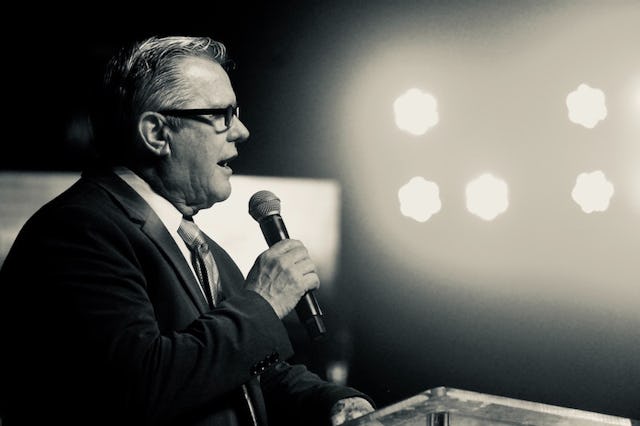
Cake values integrity and transparency. We follow a strict editorial process to provide you with the best content possible. We also may earn commission from purchases made through affiliate links. As an Amazon Associate, we earn from qualifying purchases. Learn more in our affiliate disclosure .
A tribute takes on so many different meanings, it can be hard to remember what it’s supposed to be. But when you write a tribute speech, you can get to its true purpose, which is to honor a specific person. Usually, you can hear tribute speeches at funerals, memorials, and celebrations -- but all tend to follow a similar formula.
Also see our tribute speech topic ideas and tribute speech samples below for some ideas to get you started.
If you’re speaking at a funeral or at a memorial, you might need to write a tribute speech. Or even if you’re speaking at a celebration and simply focusing this piece on a loved one who has died, this guide is for you.
You want your tribute speech to use the right words and to paint an accurate, admirable picture of the person. A heartfelt speech evokes emotion in the listeners and conveys a clear message.
Tip : While speaking at a virtual event, like a live-streamed memorial organized by a service such as GatheringUs , practice your speech using your video conferencing software ahead of time so you can anticipate and fix any audio issues.
Here is a quick overview of the steps for writing a tribute speech:
- Think About the Person
- Write an Outline
- Get the Audience’s Attention
- Make Your Points
- Finish Strong
- Practice Your Speech
Step 1: Think About the Person
What purpose does your tribute speech serve? Are you sharing a particular moment in a loved one’s life, writing about their successes, or about their positive attributes? Do you want the audience to come away with a particular message or understanding of your loved one?
Brainstorm a few characteristics or key points you’d like to include in the tribute speech. With these kinds of speeches, it’s ok to evoke emotion and share that feeling with your audience. What emotions do you want your audience to feel? If you’re giving your speech at a memorial, you might want your words to highlight a sense of fondness or happiness. Make sure you are considering your audience as well as the person you’re writing about.
After all, writing a tribute speech for your mother will be very different than writing one for a friend.
Share your final wishes, just in case.
Create a free Cake end-of-life planning profile and instantly share your health, legal, funeral, and legacy decisions with a loved one.
Step 2: Write an Outline
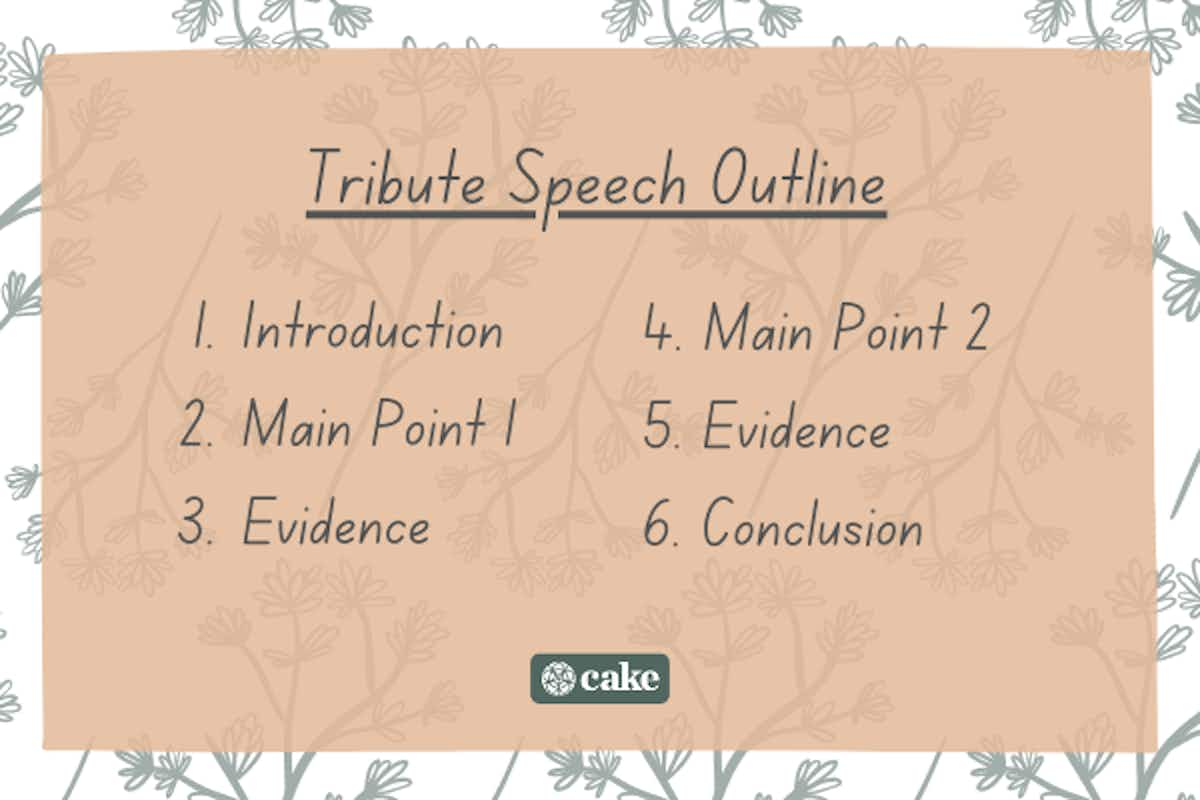
Before you begin writing, create an outline. Writing an outline helps you organize your thoughts before putting pen to paper. Most tribute speeches follow the same format. Here’s a quick guideline to follow:
- Introduction: Who is the speech about? What is your relation to this person?
- Main point 1: Start off with a key characteristic of the person you’re talking about, such as their caring nature or listening skills.
- Evidence: What evidence do you have that supports your main point? For instance, if they were a caring person, talk about a time they helped others.
- Main point 2: What’s another point you’d like to make about the person?
- Evidence: Again, support your point.
- Conclusion: Repeat your crucial points and end with something meaningful.
You can include as many main points as you’d wish, but less is usually more. If you’re giving a speech at a funeral, there may be time limits to consider. Knowing what to say when someone dies is never easy. Using an outline organizes your thoughts in a clear way no matter the purpose of your speech.
Step 3: Get the Audience’s Attention
The hardest part of a tribute speech is often the introduction. How do you capture the audience’s attention? If your speech is during a funeral, for instance, emotions are already high. If you’re giving a speech at another event or celebration, you similarly need to capture attention. How do you hook listeners with your tribute?
Start by relating to the listeners themselves. You need to appeal to the audience on a personal level to develop a connection with your words. If you’re speaking at a funeral, remind them how the deceased person brought everyone together. Open with your relationship with this person, and talk about your loved one’s role in your life.
A good way to start is with a personal story. Humans naturally are drawn to stories. Including one at the beginning of your speech brings the audience closer to you. From there, it’s easier to share your main points with the listeners’ full attention.
Step 4: Make Your Points
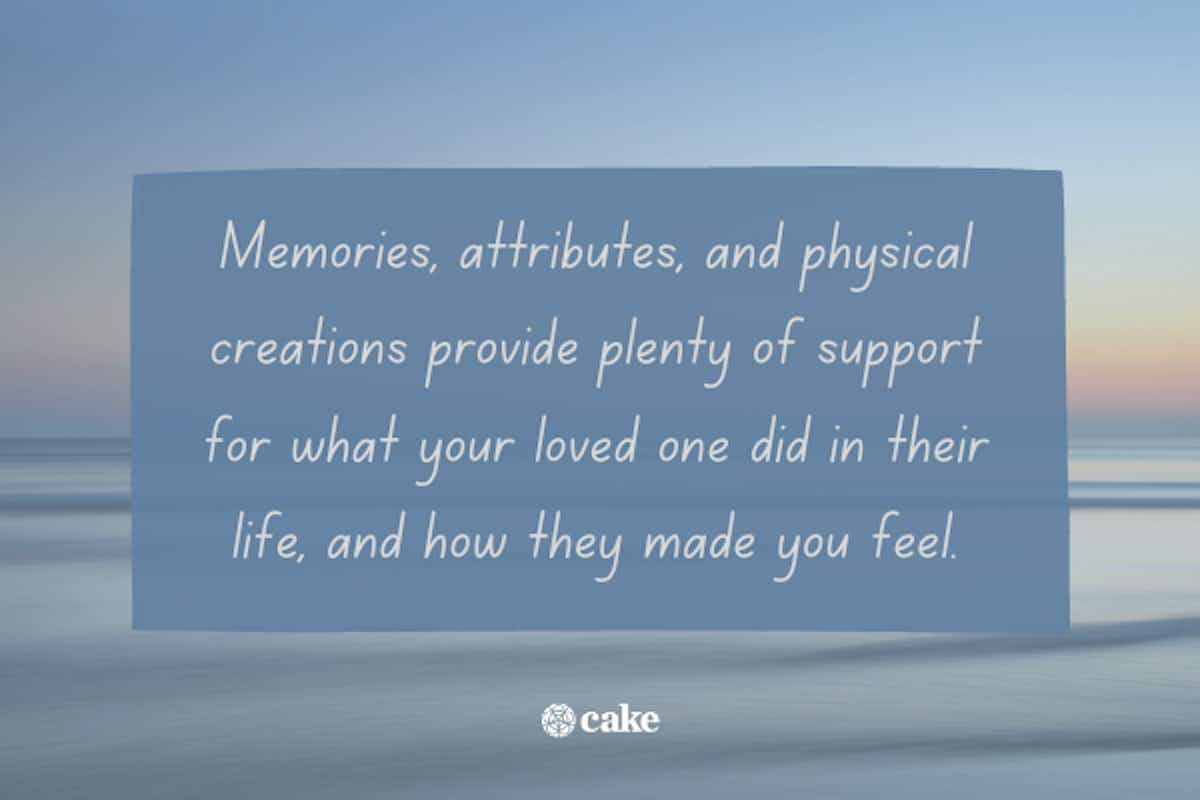
It might be tempting to drag out your introduction, especially if you’re using a personal take to capture the audience’s attention. Consider keeping the introduction brief so you can get to your point sooner rather than later. A concisely worded speech makes more of an impact through brevity and pauses than long drawn-out sentences.
With a tribute speech, you might include any of the following:
- The person’s characteristics
- The person’s accomplishments
- The person’s lasting impact
- Your experience with the person
All of these need real-life evidence. Memories, attributes, and physical creations provide plenty of support for what your loved one did in their life, and how they made you feel. How you share these main points is up to you.
Consider how you knew this person personally. Do you have a particularly funny or touching memory that was not shared widely? Did you see a special side of this person? These are all valuable questions to answer when writing a memorial tribute.
Step 5: Finish Strong
Finish your tribute speech on a high note. Popular quotes or poems can provide a way to tie up your speech. Or even ending with a quote or familiar saying from your loved one can leave your audience fondly remembering the person. Wrapping up your tribute speech can also be used to recall your main points and making a final statement about the person.
You might ask the audience to remember their own favorite memory of this person or to think of them when they visit a certain place. Either way, leave them with something memorable.
Step 6: Practice Your Speech
Finally, before you present, it’s time to practice. If you’re anxious, use these tips to put you at ease:
- Think of your speech as a performance, not just a reading
- Make eye contact with your audience
- Stand up straight and tall
- Focus on your storytelling skills
- Let your passion show
As long as you’re putting emotion into the topic, this shines through for the audience. Practice really does make perfect. Don’t be afraid to share your speech with your friends and family before the big day.
Tribute Speech Topic Ideas
For inspiration planning your tribute speech, review these topic ideas below. Your tribute can be about anything that matters to you.
- Write about a physical tribute to made for your favorite person.
- Write about a loved one who passed.
- Describe an event involving yourself and a loved one.
- Share a memory.
- Give a tribute to a place that matters to you.
- What movie or book inspired you?
- Did an incident ever change your life?
- Give a toast to someone who matters to you.
- Share someone or something that changed your mind.
- Explain the relationships that mean the most to you.
Tribute Speech Samples
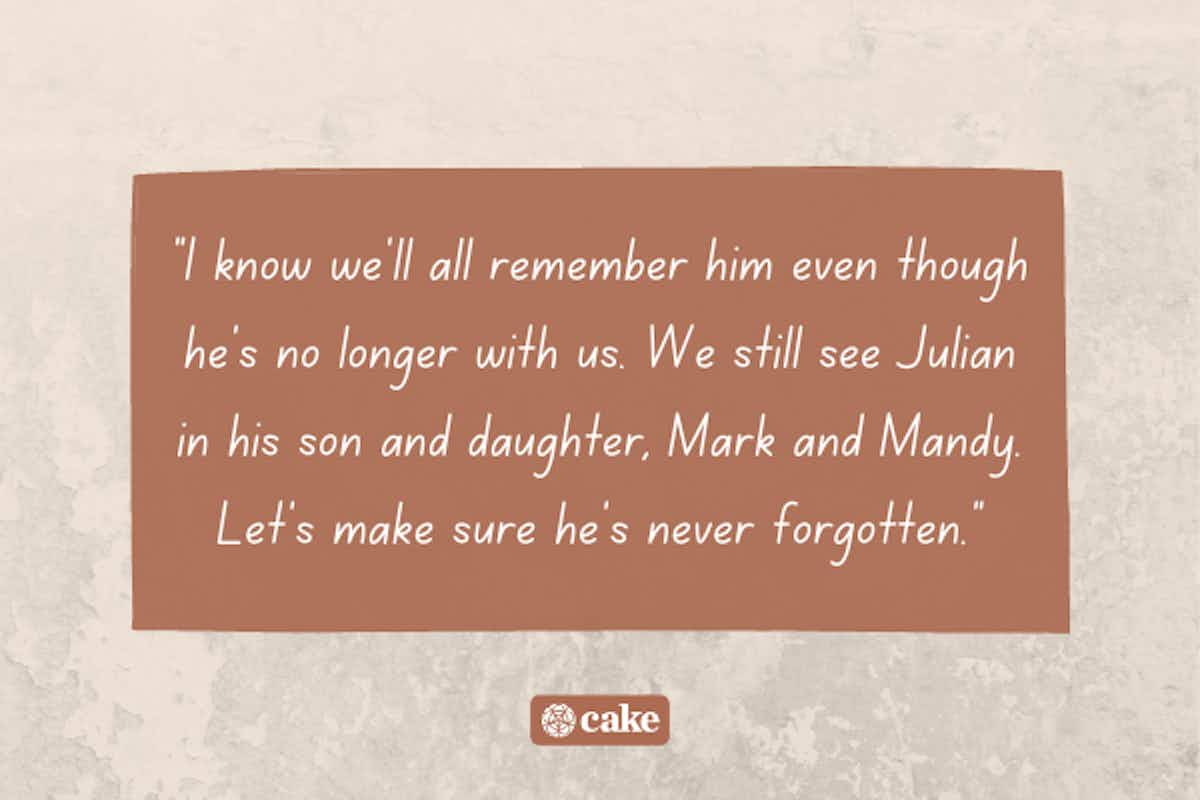
To get a strong feel for what a tribute speech looks like, read through these samples below. Each speech serves a different purpose, but you’ll see how they impact the audience through storytelling and compassion.
Tribute to a friend after their passing
"Good evening, everyone. Thank you for joining me to celebrate the life of my dear friend, Julian. All of us here admired Julian’s devotion to his family. I first met Julian through his wife, Stephanie. There was never a time when he wasn’t raving about Stephanie and all of their adventures together. I remember specifically one late night at work. Julian was the first to tell the whole office to head home. He always said nothing was more important than family, and that was certainly true. That’s the legacy Julian leaves behind: his shining family. I know we’ll all remember him even though he’s no longer with us. We still see Julian in his son and daughter, Mark and Mandy. Let’s make sure he’s never forgotten."
Tribute to a coworker "Thanks for joining me at this year’s celebration. Today, I’d like to highlight the success of Luisa, one of our best underwriters. Luisa is dedicated to her clients and helping them secure the home of their dreams. When Luisa first began working here, she would spend hours pouring over each applicant’s documents. She wanted to get everything right the first time. “The family is counting on us,” she would say. Luisa is right. It’s this kind of passion and attention to detail that makes her such an asset to our company."
Tribute to a sibling for a wedding
"I’m so thankful to be speaking about June on her wedding day. June and I have known each other for basically our whole lives, give or take the two years of me being an only child. Since then, June has always been the one who had my back. From the playground to college, she was always there. June is the first person I want to tell about my day — even if she’s bad at answering her phone! I am so grateful for our special bond. I just wanted to say thank you to my little sister for being my rock.:
Write a Powerful Tribute Speech
With the steps and examples listed above, hopefully you have some inspiration to help you write a top-notch tribute speech. From learning how to hook listeners to find the right words to say, you have many paths you can take with a tribute.
And in the end, a tribute speech is a commemoration of someone special. Whether you’re giving your speech as a sympathy message at a funeral or at a celebration, make the most of this opportunity.
Everyone deserves to be remembered. Creating a tribute speech is a powerful way to evoke emotion and build strong relationships. They are for personal and professional relationships, remembering those who have died, and even just reminding us of the things we love most. It’s time to put your own pen to paper in honor of someone special.
For more help finding the right words, read our guide to what to say on a death anniversary .
Categories:
You may also like.

How to Write a Commemorative Speech: Examples & Tips

How to Write a Funeral Speech for Dad From a Daughter

How to Write a Tribute Speech to Your Mother: Step-By-Step

How to Write an Inspiring Farewell Speech: Step-By-Step

VIDEO
COMMENTS
Commemorative Speech Topic Ideas. Now that you know how to write a commemorative speech, are you still having trouble with step one, i.e. deciding on a topic? Here are a few ideas to get you started, followed by some examples. A broad look at a relative's life; A relative's involvement in a historical event, such as a war or movement
Step 1: Pick a Subject. The first step is to choose a topic and determine what is commemorative speech about. You can pay tribute to someone's legacy, acknowledge contributions, or salute to the welfare cause of any personality. Go through some interesting informative speech topics to have an idea about your speech.
Step 1: Start with an Attention-Grabbing Opener. Your speech needs to capture the audience's attention from the very beginning. So start your commemorative speech with a compelling story, a relevant quote, a rhetorical question, or a surprising fact. The goal is to make the audience want to listen.
A: A commemorative speech is a speech given to honor and remember a person, event, or significant milestone. It serves to evoke emotions and create a lasting impact on the audience. Q: How do I write a commemorative speech? A: To write a commemorative speech, you should start by researching the subject and gathering relevant information.
In this step-by-step guide, we'll take you through each stage of the process, giving you the tools and techniques you need to create a powerful and inspiring tribute. Understanding the Purpose of a Commemorative Speech. Commemorative speeches hold a special place in the world of public speaking.
Are you writing a commemorative speech and looking for some tips and advice? Learn how to write something meaningful, respectful and courteous here.
Steve Jobs's Commencement Speech at Stanford University. "Your time is limited, so don't waste it living someone else's life. Don't be trapped by dogma — which is living with the results of other people's thinking. Don't let the noise of others' opinions drown out your own inner voice.
This kind of speech includes personal touch and the tips and tricks given here will help you write a speech successfully. Commemorative speech requires a focus on the past, present, and future aspects of the topic. For instance, success, loyalty, wisdom, courage, hope, etc. It can also be an award acceptance speech, or a eulogy to honor someone ...
In summary, a great commemorative/tribute speech: is in tune with the audience's values. is sincere and relevant. uses the language of oratory (figurative language) to capture the hearts of its hearers. includes story telling. invokes all the senses - sight, sound, touch, smell & taste. leaves the audience uplifted and inspired.
How to Write a Commemorative Speech. Once you have gathered all the necessary information, you are ready to write your speech. Follow these steps to create a touching commemorative speech: When you are giving a commemorative speech, open your speech with a catchy hook. A hook is an opening sentence of the introductory paragraph.
Toasts. The fourth special occasion speech is a toast. A toast is a short speech during special and personal events like weddings, anniversaries, birthdays, or even career milestones like a new job or promotion. The purpose of a toast is to congratulate, admire, or remember someone and show gratitude or appreciation.
Write your commemorative address. Keep focused on: First, establish recognition, mention situations and moments everyone recognize; Second, examples, proof, evidence. Reason (s) why we honor and celebrate, and learn from her/him/it; Third, tie to the audience; Fourth, things your listeners should do.
How to begin writing a tribute speech. The first step in your process is finding out as much as you can about the occasion itself and then deciding on a topic, (if it hasn't already been decided for you). You'll want to know: who the audience is. whether you are the only speaker, or one in a series of speakers.
To begin, make sure you fully understand the theme of your commemorative speech. You want to recognize the person, place, or thing you focus on. This usually means you'll want to keep the theme upbeat or light, focusing on their accomplishments and hope. Here are a few questions to guide your search for the right theme:
4. Create a Commemorative Speech Outline. Once you have figured out the theme and other aspects from the above points, it's time to create an outline. The basic commemorative speech outline contains the following: Introduction. Grabs the audience's attention with a compelling opening. Introduces the occasion and the purpose of the speech.
This tutorial is a practical time-saver that will enable you to get good at speeches. Watch our tutorial on How To Prepare A Commemorative Speech from one of...
Template to Commemorate a Sibling or Step-Sibling. "My sister, Hailee, was always the one comfortable speaking in front of a room. When it came to presenting to others, she glowed. Most people hate public speaking, but she wasn't one of them. That was because Hailee was a teacher, one of the best I've ever met.
Some types of commemorative speeches include the eulogy, the speech of nomination, the speech of goodwill, the wedding toast, and the award acceptance speech. You may also see presentation speech . Commemorative speeches are not simply informative, they act as a way for people to remember why they celebrate that in the first place.
Leadership and Advocacy. A. Leading by Example. True leaders lead by example. Our nursing pioneers have not only excelled in their clinical roles but have also taken on leadership positions. They have mentored new generations of nurses, inspiring them to reach their full potential. B. Advocating for Change.
A commemorative speech is one of the important ways of honoring someone or something for the good they have done. These speeches are delivered when celebrating a special occurrence to pay tribute to the subject. Knowing how to write a good speech will ensure that the main achievements of the subject are celebrated and remembered by those who ...
The aim of an informative speech is to communicate information clearly and accurately. The aim of a commemorative speech is to express feelings, arouse sentiments, and inspire. It is NOT just a list of a persons achievements, accomplishments and/or background; it is much more. Commemorative speeches depend above all on the creative and subtle ...
The commemorative speech definition refers to a type of speech delivered to celebrate, commemorate or remember an important event, person, or milestone. It's about honoring someone and celebrating their life and accomplishments with friends and family. When writing a commemorative speech, itâ s important to create a message that reflects the ...
A commemorative speech is a powerful tool for reflection, celebration, and inspiration. By focusing on the values and achievements associated with your subject, and by crafting a speech that resonates emotionally and intellectually with your audience, you can create a lasting impact that extends beyond the event itself.
The big picture: Biden's speech and laying of a wreath at the Tomb of the Unknown Soldier are annual traditions for the president on Memorial Day. Biden was accompanied at the tomb by Vice ...
President Joe Biden speaks during the National Memorial Day Wreath-Laying and Observance Ceremony at Arlington National Cemetery, in Washington, DC, on May 27. Ken Cedeno/Reuters. The day is also ...
An act of Congress changed Memorial Day from every May 30th to the last Monday in May in 1971. Dennis said the creation of the three-day weekend recognized that Memorial Day had long been ...
And in the end, a tribute speech is a commemoration of someone special. Whether you're giving your speech as a sympathy message at a funeral or at a celebration, make the most of this opportunity. Everyone deserves to be remembered. Creating a tribute speech is a powerful way to evoke emotion and build strong relationships.
In a poignant speech, he emphasized the enduring debt owed to these fallen soldiers for their courage, service and sacrifice in defense of a cause greater than themselves. "In this to us sacred spot and hour let us combine reverence and tribute and pledge for the future. We gather to dedicate this grove and tablet to the memory of the ...
President Biden used his Memorial Day speech to honor troops who died fighting for the United States, saying they gave their lives in the hope of a "more perfect union" during remarks at Arlington National Cemetery. The big picture: Biden's speech and laying of a wreath at the Tomb of the Unknown Soldier are annual traditions for the president ...
01:22. Biden thanks the military for protecting the country during commencement speech. 01:19. Teen nicknamed "God's influencer" set to become Catholic Church's first millennial saint. 02:22 ...